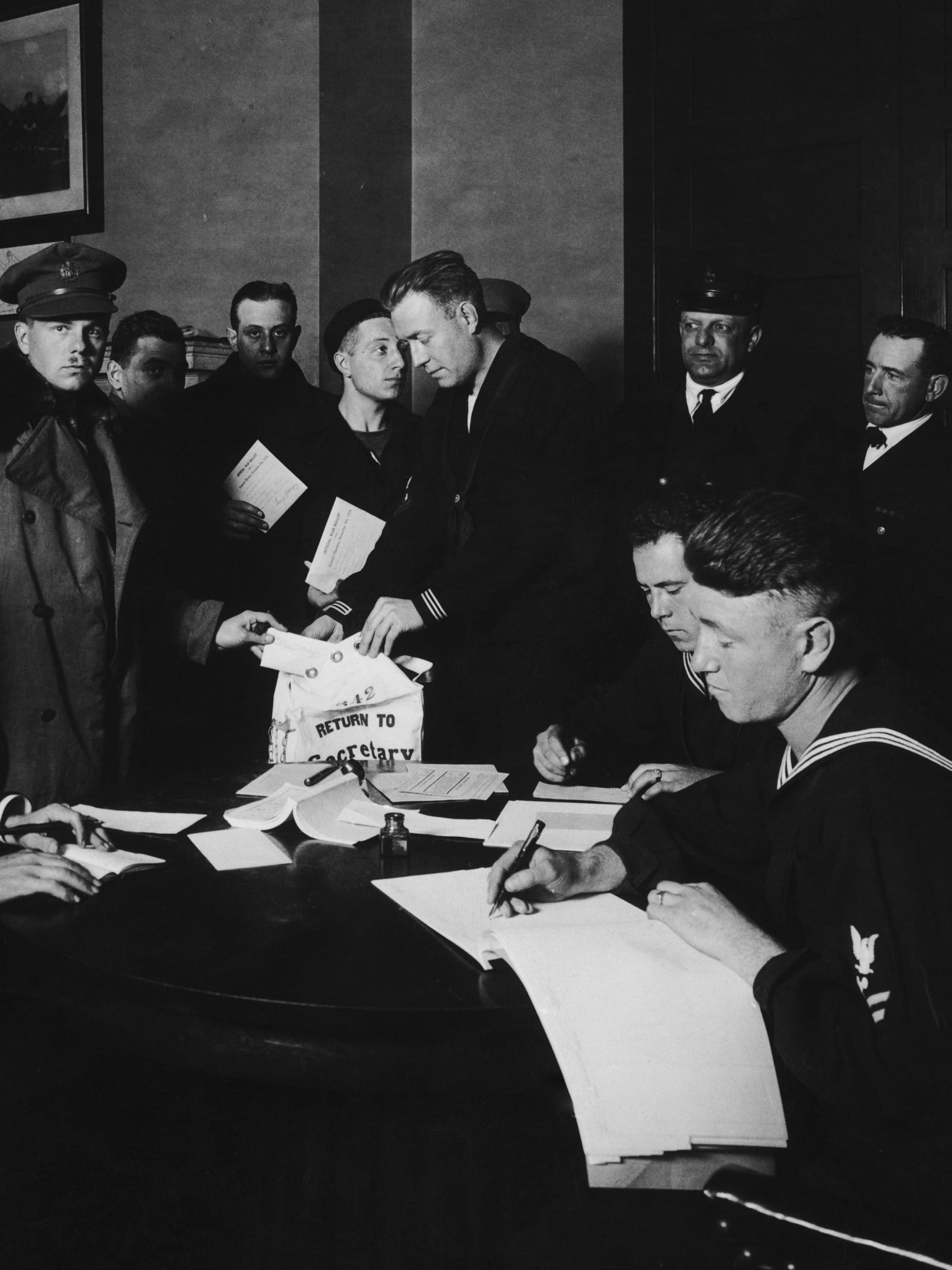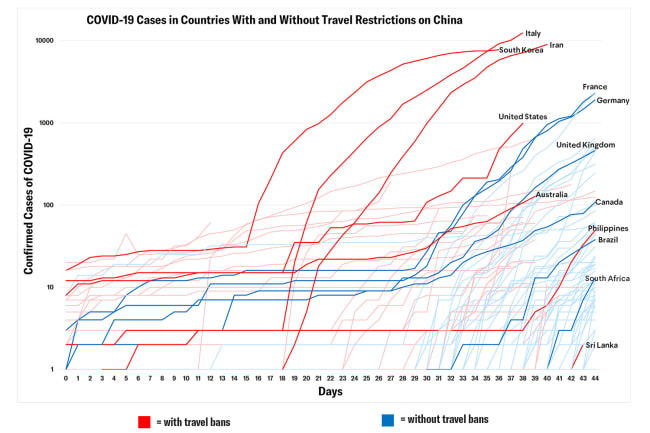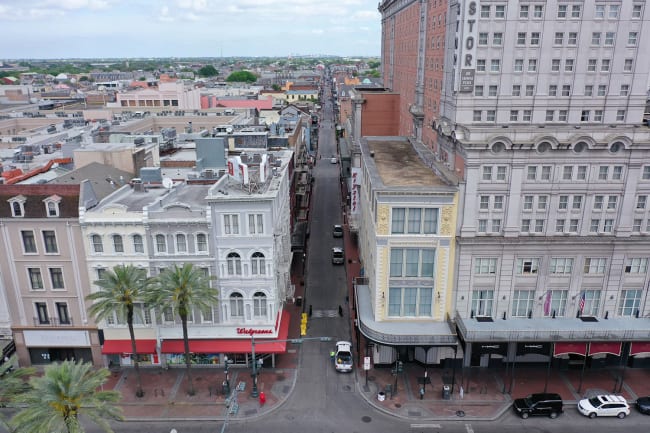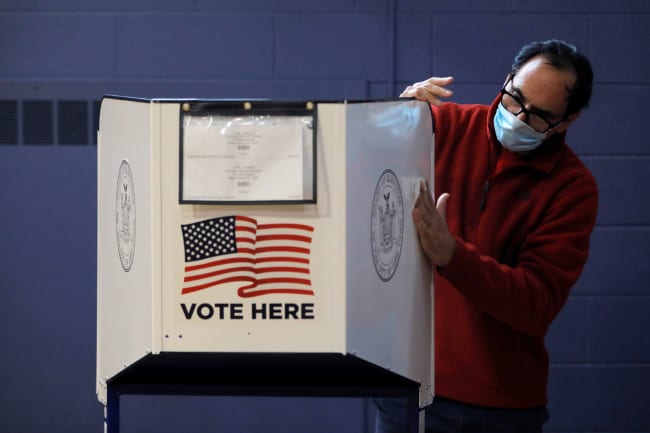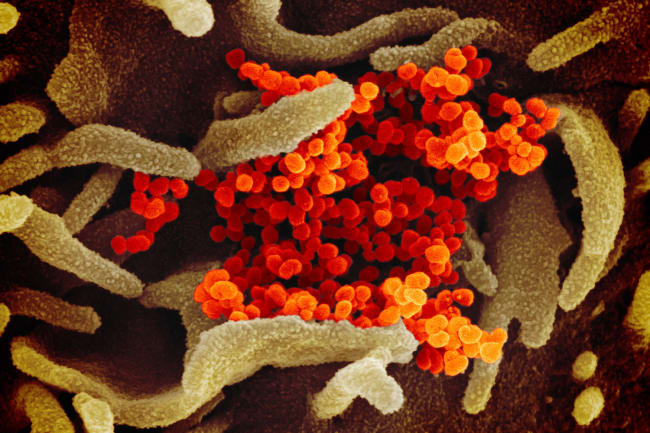Public health emergency or not, much of the world has decided that the vote must go on. This year, nations have had to confront the worst global public health crisis in a century, and many have done so in the midst of crucial political moments. Since February 2020, more than sixty countries have postponed election events. However, almost as many have pushed forward with national votes. While some election-holding countries had all but vanquished COVID-19 when they went to the polls, such as New Zealand and South Korea, many moved forward with elections despite high or increasing levels of COVID-19 transmission. The United States even held its election just one day before setting a global record for new COVID-19 cases reported in one day.
Cases of COVID-19 can and have surged following elections
While there has been no shortage of discussion on how the pandemic affects voters' decisions, there has so far been limited exploration of how elections impact COVID-19 transmission. As more countries hold national votes in this pandemic, are they setting themselves up for mass super-spreader events? If so, what health security measures can and should governments implement to protect their voting populations? While historical and current data are limited, they already offer lessons. Cases of COVID-19 can and have surged following elections, and governments holding national votes in this pandemic should prepare accordingly.
Looking to the past, evidence suggests elections can be held safely during pandemic or epidemic events, but, if sufficient health and safety measures are not taken, infections can increase post-election:
- During the 1918 influenza pandemic, the United States held national midterm elections. Although some states encouraged or even required voters to wear masks, certain campaigns moved to newspapers and radio. Some cities even relocated polling places outdoors, and certain states such as Nebraska lifted some or all restrictions before the election. In Nebraska, infection and death rates climbed after the vote.
- More recently, Liberia held parliamentary elections in 2014 during the West African Ebola epidemic. Alongside an intense public health campaign, authorities implemented health measures to ensure safe voting. Voters were required to sanitize their hands, stand one meter apart, offer identification at a distance, bring their own pens, and undergo temperature checks. Despite considerable international concern, the Liberian election occurred without major public health consequences.
However, in each of these two cases, in-person voter turnout was low, with the United States seeing 40 percent of eligible voters cast ballots and Liberia only 25 percent.
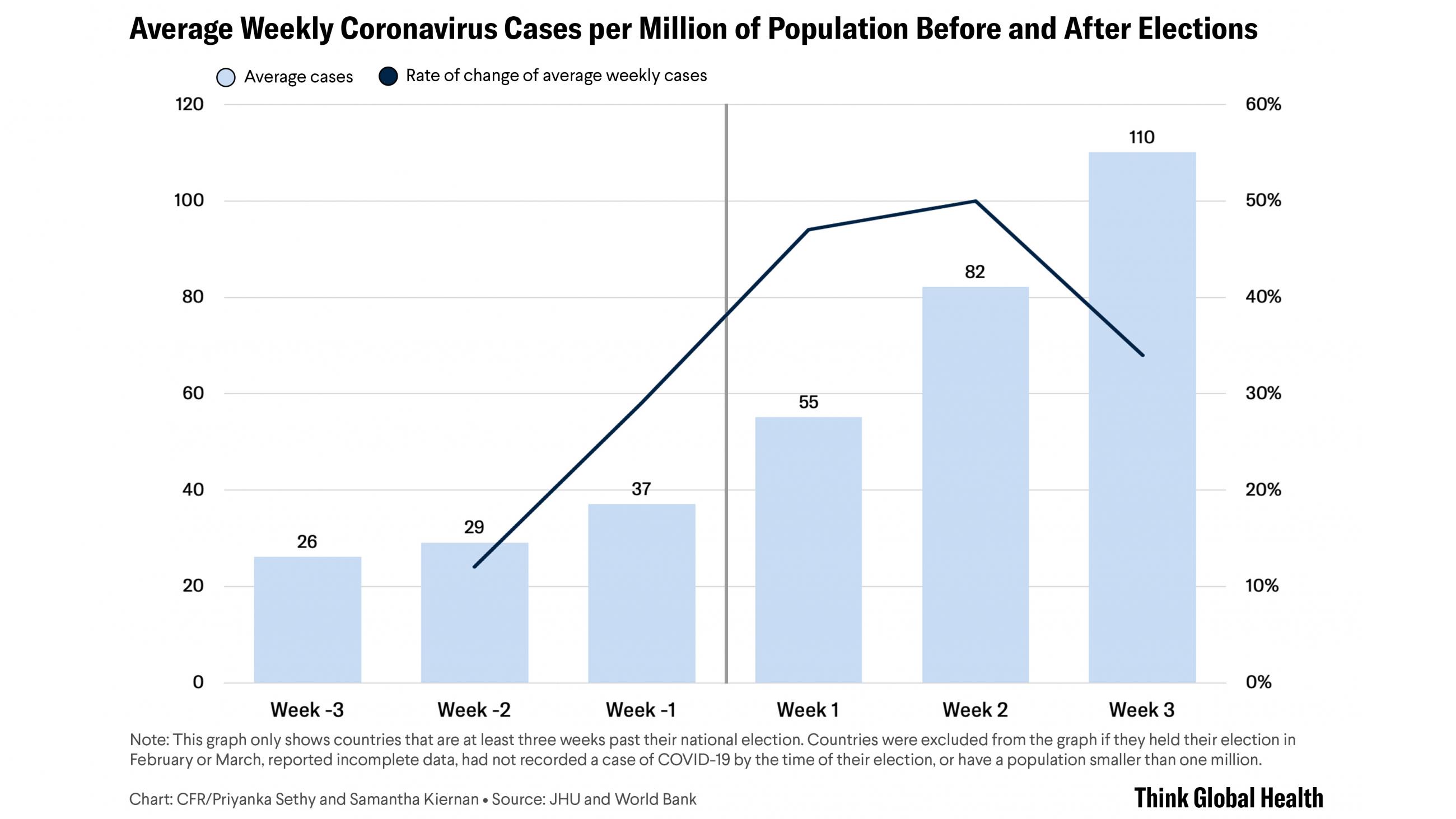
When we look at this coronavirus pandemic, early evidence provides a clear warning on COVID-19 transmission and elections. On aggregate, new weekly COVID-19 cases per million of population have increased in the three weeks following an election, with the sharpest surges in the first- and second-weeks post-vote. In other words, countries are indeed seeing COVID-19 surges after national votes.
Despite the average country experiencing a clear increase in COVID-19 cases post-election, whether these surges are due to super-spreader elections or other confounding causes remains uncertain. Many countries that saw post-election surges, such as the Dominican Republic, Jamaica, Kyrgyzstan, and Trinidad and Tobago, were grappling with rising daily cases going into their elections. Other nations such as Iran and Serbia were accused of significantly underreporting data prior to their elections to encourage voter turnout. In some countries, religious, cultural, and social events were also suspected of fueling post-election spread; in the United States, for example, where mass celebrations followed its November presidential election, experts are already warning of a large surge. Additionally, pre-election events, such as campaign rallies or receptions, could also become mass super-spreader incidents.
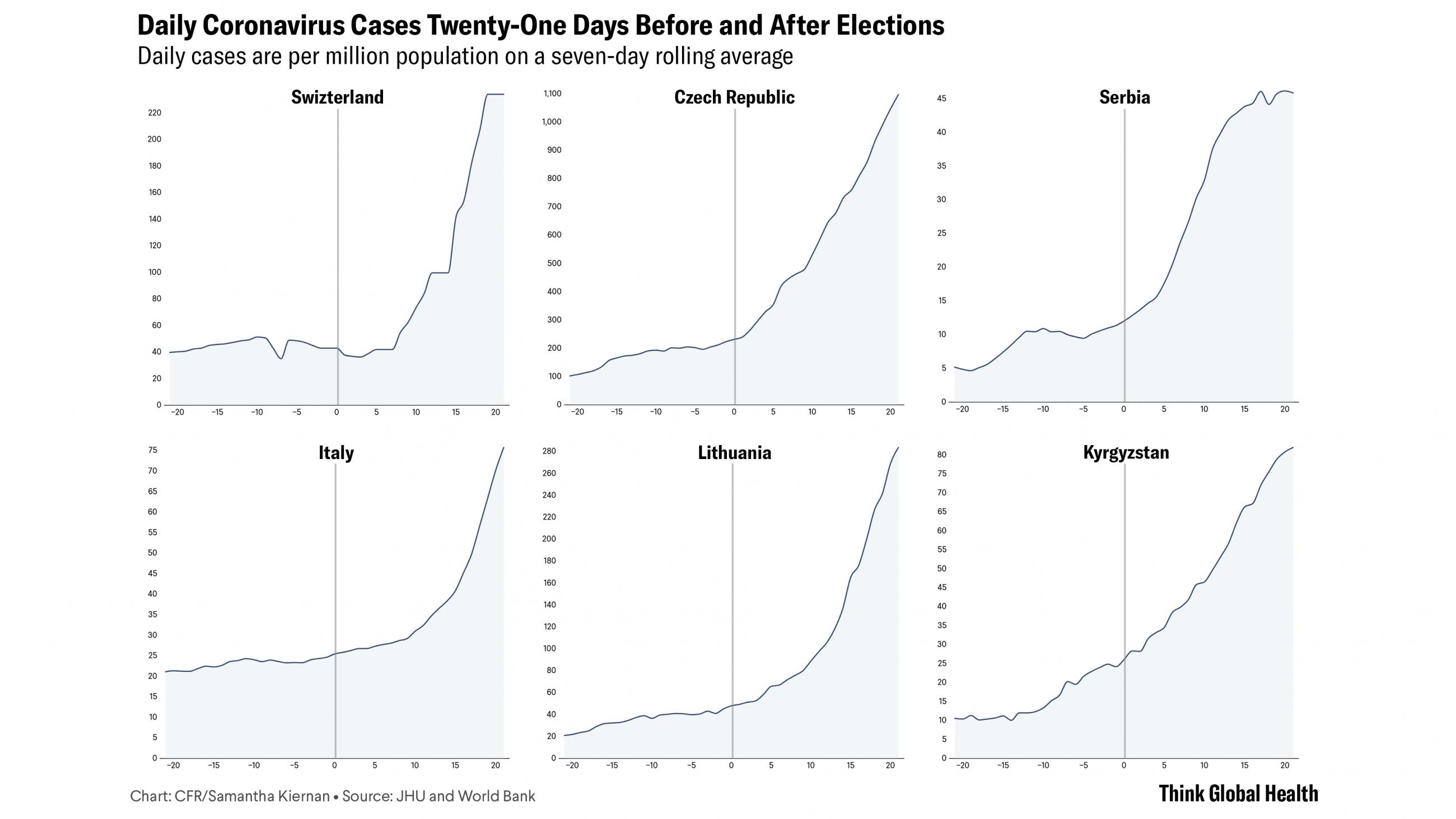
However, Europe's fall elections suggest national voting events may have an independent impact on COVID-19 transmission. Take Italy for instance. Days before Italy's referendum, local media was still commending the country for avoiding a dreaded second wave. Just a week after polls closed, however, new daily cases per capita began to trend steadily upwards, as did the country's test positivity rate, or the share of COVID-19 tests that are positive. This pattern suggests that increasing infection rates, not increasing testing, were driving the country's surge. Switzerland had a similar experience, jumping from one of the least-affected countries in Europe to one of the worst-hit roughly three weeks after its referendum. The Czech Republic and Lithuania also saw sharp increases in cases and test positivity following their fall elections, though they were already recording rising cases prior to their elections. Whether these increases are due to national elections, lax measures, the larger European surge in COVID-19 cases, or other factors is not clear. However, given that three out of these four countries took aggressive measures to prevent spread at the polls, their experiences indicate that countries with higher rates of community transmission in the weeks preceding a vote may be more likely to see a post-election surge.
Though this evidence may seem worrisome, it is important to caution that the data so far are limited and do not imply all nations will see a surge in COVID-19 cases after their election. Only fifty-six countries have actually held national votes amid this pandemic, and many that have are island nations, countries with smaller populations, or places with little to no community transmission of COVID-19 such as Mongolia, South Korea, and Sri Lanka. Most of these countries have not seen case surges following their elections.
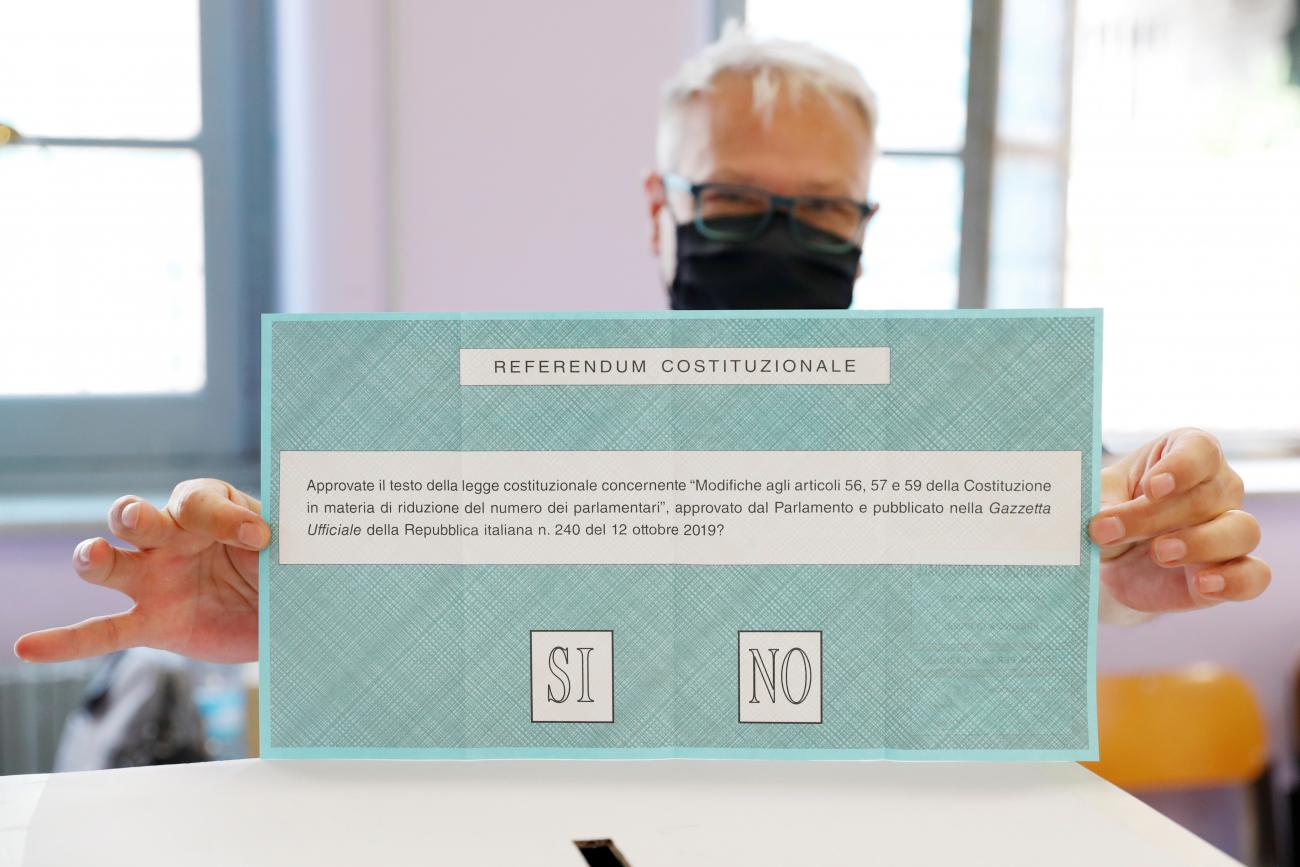
When looking at other research on whether elections are a primary driver of COVID-19 infections, the literature is also inconclusive. Take, for instance, Wisconsin—the first state to hold in-person voting after stay-at-home orders were issued. One April study [PDF] led by economists at the University of Wisconsin found a "statically and economically significant association between in-person voting density and the spread of COVID-19 two to three weeks after the election" at the county level. A separate Centers for Disease Control and Prevention study, however, focused on Milwaukee and found no clear increase in cases, hospitalizations, or deaths after the same election. Outside of the United States, South Korean health authorities concluded that not one case related to their spring parliamentary election was reported during the fourteen days after. Meanwhile, Malaysia's prime minister cited elections in the state of Sabah as one of the main driver's behind the country's recent surge.
So, at this point, whether countries scheduled to hold elections—particularly those with high levels of transmission or larger populations—are setting themselves up for national super-spreader events is impossible to say with certainty, though early evidence suggests a clear risk of post-vote surges.
As for the second question—what actions government can and should take—the answer is the same as for any public gathering: wear a mask, wash your hands and disinfect surfaces, keep a distance, offer special accommodations to those who need it, and avoid crowds. Elections will be held, COVID-19 or not, and governments have a responsibility to do all they can to ensure the health and safety of their voting populaces.
Health Security Measures Taken for Elections by Country
Despite the uncertainty around elections' effects on COVID-19 transmission, governments can and should learn from the fifty-six countries that have held national elections or referendums since the WHO declared COVID-19 a Public Health Emergency of International Concern (PHEIC). Election health security measures have varied from country to country, with some more common than others.
This tracker identifies six common types of measures: personal protective equipment (PPE) and other equipment, social distancing, special accommodations, hygiene and sanitation, ventilation, and postponement. Five of these measures can be implemented during an election, whereas postponement delays the election until a later date. Relying on government documents, international organizations, and local and international media, this tracker uses the following criteria to identify which health security measures countries took during national elections:
- PPE and other equipment: Countries that mandated or recommended wearing PPE such as masks or gloves, provided PPE to voters or poll workers, required temperature checks, or issued restrictions or guidelines on other voting equipment such as pens are identified as implementing PPE and other equipment measures.
- Social distancing: Countries that required or encouraged social distancing at polling places and/or took measures to facilitate social distancing—such as providing separate entrances and exits, establishing specific voting hours, increasing polling places, or limiting the number of voters inside a polling place—are identified as implementing social distancing measures.
- Special accommodations: Countries that offered special accommodations to quarantined, isolated, vulnerable, or infected voters, such as by expanding mail-in or at-home voting or offering separate voting days or hours or nontraditional voting locations, are identified as implementing special accommodation measures.
- Hygiene and sanitation: Countries that issued disinfection or sanitation guidelines for polling places, required voters to disinfect their hands before voting, provided sanitation or disinfection materials to polling places or voters, regulated cleaning standards in restrooms, issued guidelines around document exchanges, or took related actions are identified as implementing hygiene and sanitation measures.
- Ventilation: Countries that required or recommended ventilation of polling places—such as by holding voting outdoors, opening doors and windows, or regularly emptying polling places—are identified as implementing ventilation measures.
- Postponement: Countries that delayed a national election or referendum are identified as postponing an election.
So far, forty-one countries have implemented PPE and other barrier measures, forty-one have enforced social distancing, twenty-eight have provided special accommodations, forty-three have taken hygiene and sanitation measures, and eighteen have ensured ventilation in polling places. Fourteen countries have taken no health security measures at all, of which most were countries that had not recorded any COVID-19 cases at the time of their vote. Note, some countries have held multiple distinct elections or referendums in 2020, and so these figures reflect measures taken in the latest national vote held.
Health Security Measures By Country
As countries continue to hold elections, this tracker will be updated periodically to reflect measures taken and national transmission before and after major elections. To date, this tracker features national elections held from February 1 to November 12.
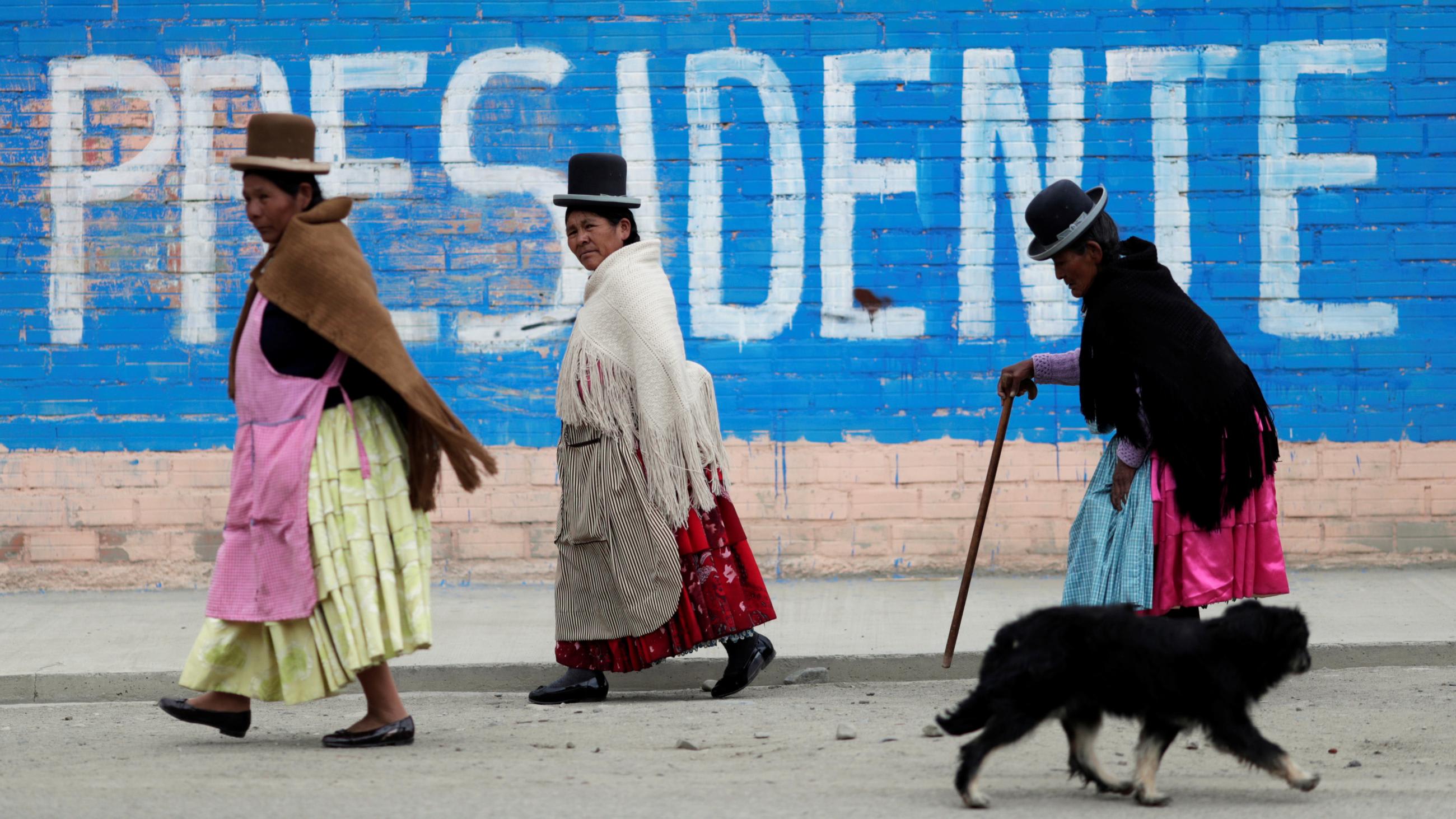
Detailed List of Electoral Health Security Measures by Country
ARMENIA (1), Referendum, Unscheduled
Armenia implemented health security measures in one category:
- Postponement: The country postponed elections originally scheduled for April 5. The new election date is still to be determined.
Sources: Reuters, Massis Post
ALGERIA (3), Referendum, November 1
Algeria implemented health security measures in three categories:
- PPE and other equipment: Algeria required that all individuals wear masks inside polling places. The country encouraged polling places to set up barrier measures.
- Social distancing: Voters were required to respect social distancing. Authorities restricted entrance into polling places to three people at a time.
- Hygiene and sanitation: Algeria required all polling places to provide hand sanitizer. Polling places removed curtains from voting booths to minimize points of contact. Polling places were disinfected prior to the referendum.
Sources: Algérie Press Service (1, 2), AFP, VOA
AZERBAIJAN (0), Parliamentary, February 9
Azerbaijan implemented no health security measures.
BELARUS (5), Presidential, August 9
Belarus implemented health security measures in five categories:
- PPE and other equipment: The country provided and required poll workers to use masks, gloves, and—if possible—face shields. Belarus also recommended voters wear masks and gloves and use their own pens.
- Social distancing: Polling places ensured at least one meter of distance between individuals and when placing chairs and tables. Precincts were also advised to separate flows of incoming and outgoing people if possible.
- Special accommodations: Belarus allowed infected people to vote from home or at polling stations in hospitals.
- Hygiene and sanitation: The country provided disinfectants and hand sanitizer in public areas. It recommended voters present identification documents in expanded form to avoid exchanging documents. Efforts were made to sanitize shared pens with antiseptics after each vote. Polling places arranged for disinfection of contact surfaces at least six times per day.
- Ventilation: Belarus recommended keeping doors open and organizing regular ventilation of polling place premises at least once a day during early voting.
Sources: Sputnik, Belarus Ministry of Health
BELIZE (4), Legislative, November 11
Belize implemented health security measures in four categories:
- PPE and other equipment: Voters were required to wear their mask at all times.
- Social distancing: People at polling places were required to maintain six feet of social distancing while waiting in line and inside the polling place. No gatherings were allowed under political tents or outside the polling place. Voters were encouraged to go home immediately after voting.
- Special accommodations: Disabled, elderly and pregnant women were given priority at polling places.
- Hygiene and sanitation: Voters were required to sanitize their hands upon entering the polling station and before dipping their fingers into the voting ink. All voter identification documents were shown at a distance in order to avoid direct contact. Poll workers sanitized pencils in between voters.
Source: Elections and Boundaries Department (1, 2)
BOLIVIA (4) General, October 18
Bolivia implemented health security measures in four categories:
- PPE and other equipment: The country required voters to wear masks at polling places, while poll workers wore masks and goggles. Authorities encouraged voters to bring their own pens. Eating was prohibited in polling places.
- Social distancing: Bolivia required social distancing of at least 1.5 meters at polling places. Voters were given special morning or afternoon slots to avoid overcrowding.
- Hygiene and sanitation: Voters were required to sanitize their hands upon entering polling places. Ink was dabbed onto voters' fingertips with cotton to avoid contagion.
- Postponed: The country postponed its elections, which were originally scheduled for May 3, and then later for September 6. Its elections took place October 18, 2020.
Sources: Ministry of Health (1, 2), Reuters, CBC
BURUDNI (0), General, May 20
Burundi implemented no COVID-19 health security measures.
CAMEROON (0), Parliamentary, February 9
Cameroon implemented no COVID-19 health security measures.
CHAD (1), Parliamentary, Unscheduled
Chad implemented health security measures in one category:
- Postponement: The country postponed its elections, which were originally scheduled for December 13, 2020. The new election date is still to be determined.
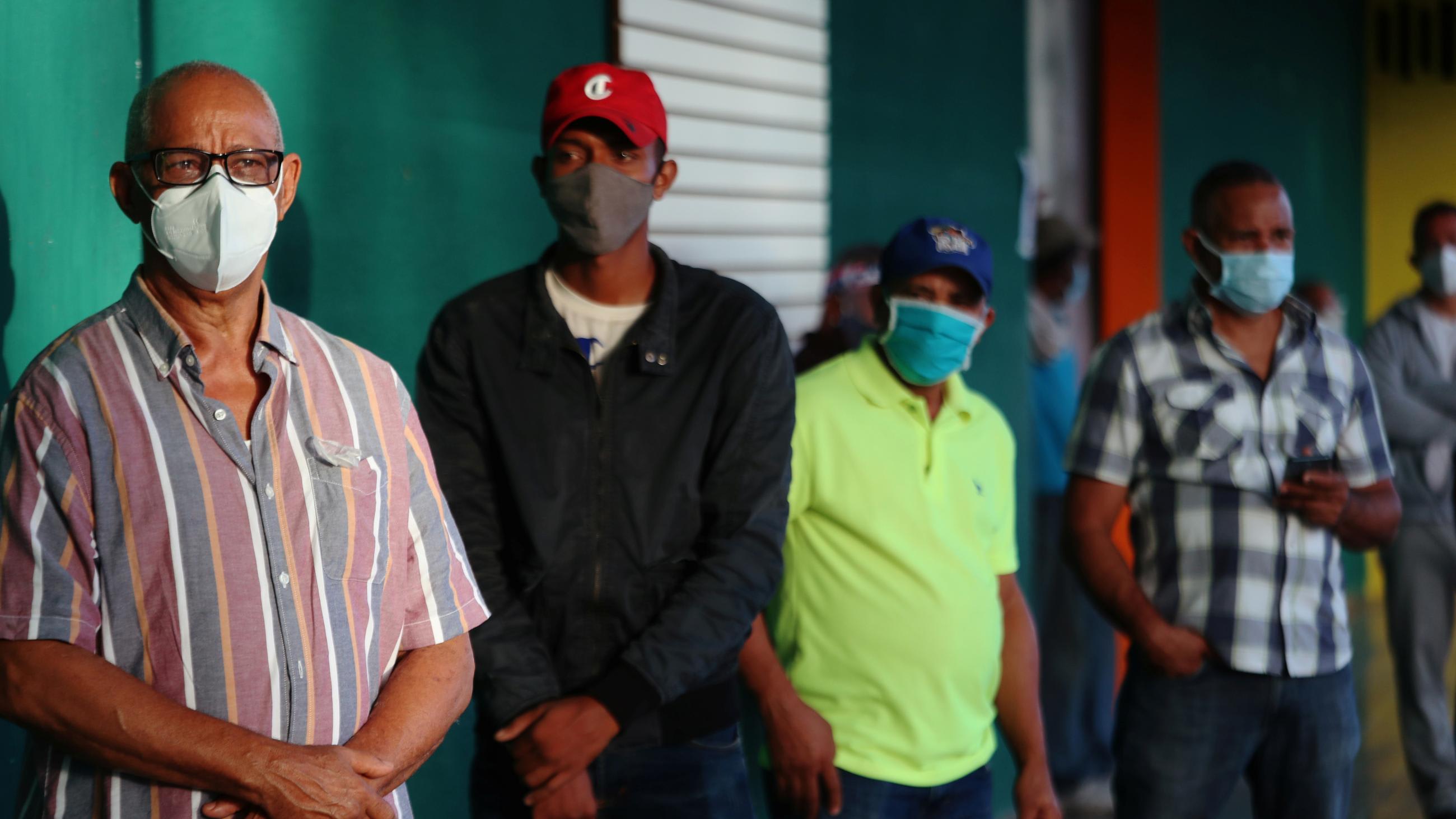
CHILE (5), Referendum, October 25
Chile implemented health security measures in five categories:
- PPE and other equipment: Chile required all individuals to wear masks outside the home, including at polling places, and voters were encouraged to bring their own pens. Authorities asked voters to take their temperatures at home and prohibited eating at the polling places. Voters with long hair were requested to tie their hair up.
- Special accommodations: Chile offered special voting hours for voters over the age of sixty. People who had actives cases of COVID-19 were not eligible to vote in the election given that there was not enough time to set up postal options.
- Social distancing: Voters were required to maintain social distancing of at least one meter, including when waiting in line.
- Hygiene and sanitation: The country required voters to sanitize their hands upon entering the polls and upon receiving their voting and identification cards. Chile hired an additional 15,000 officials to ensure compliance with sanitary standards at polling places. Polling places were sprayed with cleaning solutions containing nano-copper particles, which they alleged were particularly effective against the coronavirus.
- Postponement: The country postponed its referendum, which was originally scheduled for April 26. Its referendum took place on October 25, 2020.
Sources: Ministry of Health (1, 2), Reuters (1,2) , The Guardian
CROATIA (5), Parliamentary, July 3
Croatia implemented health security measures in five categories:
- PPE and other equipment: The country recommended that voters wear masks and bring their own pens. It required all poll workers to wear masks and poll workers who handled identification documents to wear gloves.
- Social distancing: Croatia required voters to maintain a social distance of 1.5 meters. To facilitate social distancing, it required polling stations to put up barriers, set a maximum number of people on elevators, and maintain a schedule to regulate arrival of voters so that the number of voters at any given time was limited to the number of voting spaces in a polling facility.
- Special accommodations: Croatia permitted in-home voting for those in isolation who had not been diagnosed with COVID-19.
- Hygiene and sanitation: Disinfectants and hand sanitizer were provided at the entrances of all facilities, and voters were required to sanitize their hands upon entering the facility. Furthermore, high-contact surfaces were disinfected regularly—preferably every hour but at least once a day—and at the start and end of each day. All hand air dryers were disabled, and sufficient amounts of paper towels were provided.
- Ventilation: All voting rooms were regularly and adequately ventilated. Voting stations were advised to leave their windows open all day if possible and to organize voting queues outside the polling station.
Sources: Croatian Institute for Public Health (1, 2)
CZECH REPUBLIC (5), Senate, October 2–3 and October 9–10
The Czech Republic implemented health security measures in five categories:
- PPE and other equipment: The country required voters and poll workers to wear masks inside the polling place, and poll workers were also required to wear gloves when distributing ballots or handling identification documents. Polling places provided poll workers with masks if needed. The Czech Republic also recommended that voters bring their own stationery for editing ballot paper and use their own pens.
- Social distancing: The Czech Republic required voters and poll workers to maintain a distance of two meters from others.
- Special Accommodations: The Czech Republic permitted voters in quarantine or isolation to vote via portable ballot boxes at their home, offered special voting inside residential facilities, and allowed drive-in voting at seventy-eight polling locations.
- Hygiene and sanitation: Voters were required to sanitize their hands upon entering the facility. Polling places were disinfected regularly, particularly high-contact surfaces and voting equipment, and polling places provided disinfectants for voters at entrances and in areas for marking ballots. After voting ended, polling places disinfected surfaces and ventilation. All voter identification documents were to be shown at a distance in order to avoid direct contact.
- Ventilation: The country required adequate ventilation of polling places, if conditions allowed.
Sources: State Electoral Commission [PDF], Ministry of the Interior (1, 2, 3)
DOMINICAN REPUBLIC (3), General, July 5
The Dominican Republic implemented health security measures in three categories:
- PPE and other equipment: The country required poll workers to wear masks and gloves. Polling stations provided voters with masks, which were required inside the polling place.
- Social distancing: Polling stations required voters to maintain a social distance of two meters, even when in line.
- Hygiene and sanitation: The country required the disinfection of polling places. It advised polling place staff to use antibacterial wipes to clean high-contact surfaces and also required polling places to install hygiene kits with masks, gloves, antibacterial gel, and antibacterial wipes. Voters and staff were required to sanitize their hands when entering the facility. All identification documents were to be disinfected when presented.
Source: Central Election Board, CNN
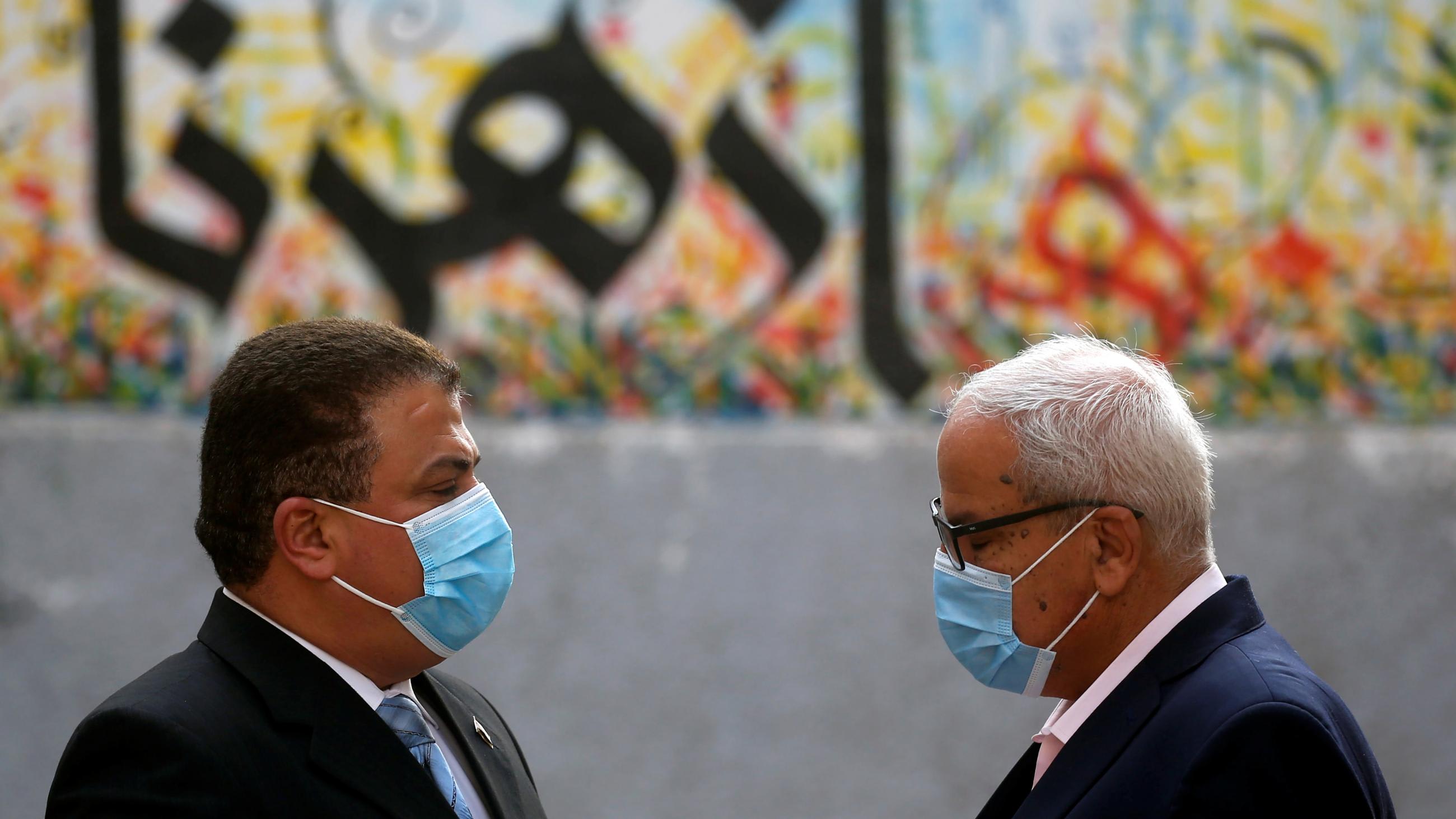
EGYPT (3), Senate, August 11–12 and September 8–9
Egypt implemented health security measures in three categories:
- PPE and other equipment: Egypt mandated that all polling places provide voters with free masks that they were required to wear while voting. Poll workers were required to take voters' temperatures before they entered the facilities.
- Social distancing: In order to ensure adequate social distancing, Egypt held voting over a two-day period.
- Hygiene and sanitation: To ensure proper sanitation, Egypt required polling places to install sterilization gates at their entrances and provide disinfectants to voters at polling booths.
Sources: Reuters, Daily News Egypt, Egypt Today
EGYPT (3), Parliamentary, October 24–25 and November 7–8
Egypt implemented health security measures in three categories:
- PPE and other equipment: Egypt required voters to wear masks at polling places and provided voters with masks and gloves before entering, if they did not have them.
- Social distancing: Social distancing was strictly enforced inside polling places.
- Hygiene and sanitation: The country disinfected polling places before and during the voting period. Voters received hand sanitizer at polling places.
Sources: Reuters, Washington Post, VOA News, Egypt Independent
ETHIOPIA (1), Parliamentary, Unscheduled
Ethiopia implemented health security measures in one category:
- Postponement: The country postponed its elections originally scheduled for August 29. The new election date is still undetermined.
Sources: Reuters, Associated Press
GABON (1), Senate, Unscheduled
Gabon implemented health security measures in one category:
- Postponement: The country postponed its elections, which were originally scheduled for late 2020. The new election date is still undetermined.
Sources: Atlantic Council, EISA
GEORGIA (5), Parliamentary, October 31
Georgia implemented health security measures in five categories:
- PPE and other equipment: The country required all voters to wear masks. Polling places provided voters with individual-use pens. Anyone entering a polling place was subjected to thermal screening, and anyone with a fever was prohibited from entering. Georgia provided poll workers with gloves, face shields, and masks.
- Special accommodations: Georgia established 127 special electoral precincts and additional special mobile ballot boxes for voters in medical institutions, quarantine, or isolation. Voters in self-isolation were also permitted to vote over the phone. Georgia offered special voting to cleaners.
- Social distancing: Voters were required to maintain social distancing and asked to leave polling places immediately after voting to avoid overcrowding. Polling places limited the number of voters to two per registration desk and organized registration desks to maintain distance.
- Hygiene and sanitation: Georgia required voters to sanitize their hands upon entering and exiting the polling place. Polling places installed disinfection barriers at all entrances. The country also required polling places to disinfect high-contact surfaces at least every three hours and install proper waste containers for disposal of sanitary measures. Polling places were also cleaned before and after voting.
- Ventilation: Polling places were required to be naturally ventilated several times a day.
Sources: Central Election Commission (1, 2, 3)
GUINEA (4), Presidential, October 18
Guinea implemented health security measures in four categories:
- PPE and other equipment: The country called for masks to be worn at all times, in accordance with a national mask mandate.
- Social distancing: Authorities mandated that individuals maintain social distancing in polling locations.
- Hygiene and sanitation: The country recommended that individuals wash their hands upon entering a closed space. Guinea equipped all polling places with hand-washing kits.
- Ventilation: Guinea recommended keeping windows and doors open in closed spaces.
Sources: Association of Scientific Journalists of Guinea, National Agency for Health Security
GUINEA (2), Parliamentary, March 22
Guinea implemented health security measures in two categories:
- Social distancing: Voters were encouraged to adhere to social distancing guidelines.
- Hygiene and sanitation: Some polling stations required voters to wash their hands before casting their ballots.
Sources: United Nations, Reuters, ABC
GUYANA (0), General, March 2
Guyana implemented no COVID-19 health security measures.

ICELAND (4), Presidential, June 27
Iceland implemented health security measures in four categories:
- PPE and other equipment: Voters were provided with gloves.
- Social distancing: Polling stations required voters to maintain a social distance of two meters. Staggered voting was implemented at an increasing number of polling locations beginning on May 25.
- Special accommodations: Iceland established drive-through voting for quarantined voters. These voters were prohibited from leaving their cars or opening doors or windows, and they were also limited to no more than two voters per car.
- Hygiene and sanitation: Polling stations provided voters with hand sanitizer and disinfected voting areas and other materials regularly.
Sources: DW, Iceland Review, Visir, OSCE
IRAN (0), Legislative (first round), February 21
Iran implemented no COVID-19 health security measures during the first round of its parliamentary elections.
IRAN (4), Legislative (second round), September 11
Iran implemented health security measures in four categories during the second round of its parliamentary elections:
- PPE and other equipment: The country required voters to wear masks and requested they wear gloves at polling places.
- Social distancing: Authorities mandated that voters distance themselves from each other.
- Hygiene and sanitation: The country disinfected all polling places prior to election day.
- Postponement: Iran postponed the second round of elections, which was originally scheduled for April 17. Its second round took place on September 11.
Sources: Tasmin Daily (1, 2), UPI
IRELAND (0), General, February 8
Ireland implemented no COVID-19 health security measures.
ISRAEL (2), General, March 2
Israel implemented health security measures in two categories:
- PPE and other equipment: Polling stations required quarantined voters to wear masks and gloves. They also required paramedics to wear masks and PPE.
- Special accommodations: Israel established separate polling places with paramedics at which quarantined Israelis could vote. It prohibited quarantined voters with any symptoms including a cough, breathing difficulties, or fevers from voting in person.
Sources: Central Election Committee, Haaretz
ITALY (6), Referendum, September 20–21
Italy implemented health security measures in six categories:
- PPE and other equipment: Polling places required voters to wear masks upon entrance. Voters with a fever-grade temperature were prohibited from voting; however, temperatures were not taken at polling places. Instead, voters were expected to stay home if they had a fever. Poll workers were also encouraged to wear gloves.
- Social distancing: Polling places were required to utilize separate entrances and exits to maintain distinct flows of people, restrict access to the building, and if possible create specific waiting areas outside to ensure social distancing. Italy also required polling places to be buildings in which individuals could maintain at least two meters of distance between one another.
- Special accommodations: Italy prohibited people who were in quarantine, had been in contact with someone with confirmed COVID-19 in the past fourteen days, or had tested positive for COVID-19 in the past fourteen days from voting in person. At-home voting was permitted for voters who were either too sick to leave their homes or under quarantine.
- Hygiene and sanitation: Polling places were required to sanitize their booths prior to setup and at the end of each voting day and to disinfect high-contact surfaces periodically. Sanitizing products were provided in common areas, voting seats, and entrances. Voters were required to sanitize their hands before entering the polling place. All voter identification documents were to be shown at a distance in order to avoid direct contact.
- Ventilation: Polling places were instructed to either open their windows or utilize ventilation systems to facilitate regular air flow, prioritizing natural ventilation.
- Postponement: Italy postponed its referendum, which was originally scheduled for March 29. The new referendum took place on September 20 and 21.
Sources: Official Gazette of the Republic of Italy, Ministry of the Interior (1, 2, 3)
IVORY COAST (3), Presidential, October 31
Ivory Coast implemented health security measures in three categories:
- PPE and other equipment: The country required voters to wear a mask in polling places. Poll workers were asked to wear gloves.
- Social distancing: Voters were required to maintain social distancing of at least one meter.
- Hygiene and sanitation: Ivory Coast required voters to sanitize their hands upon entering and exit polling places. Shaking hands and hugging were prohibited.
Sources: Independent Electoral Commission
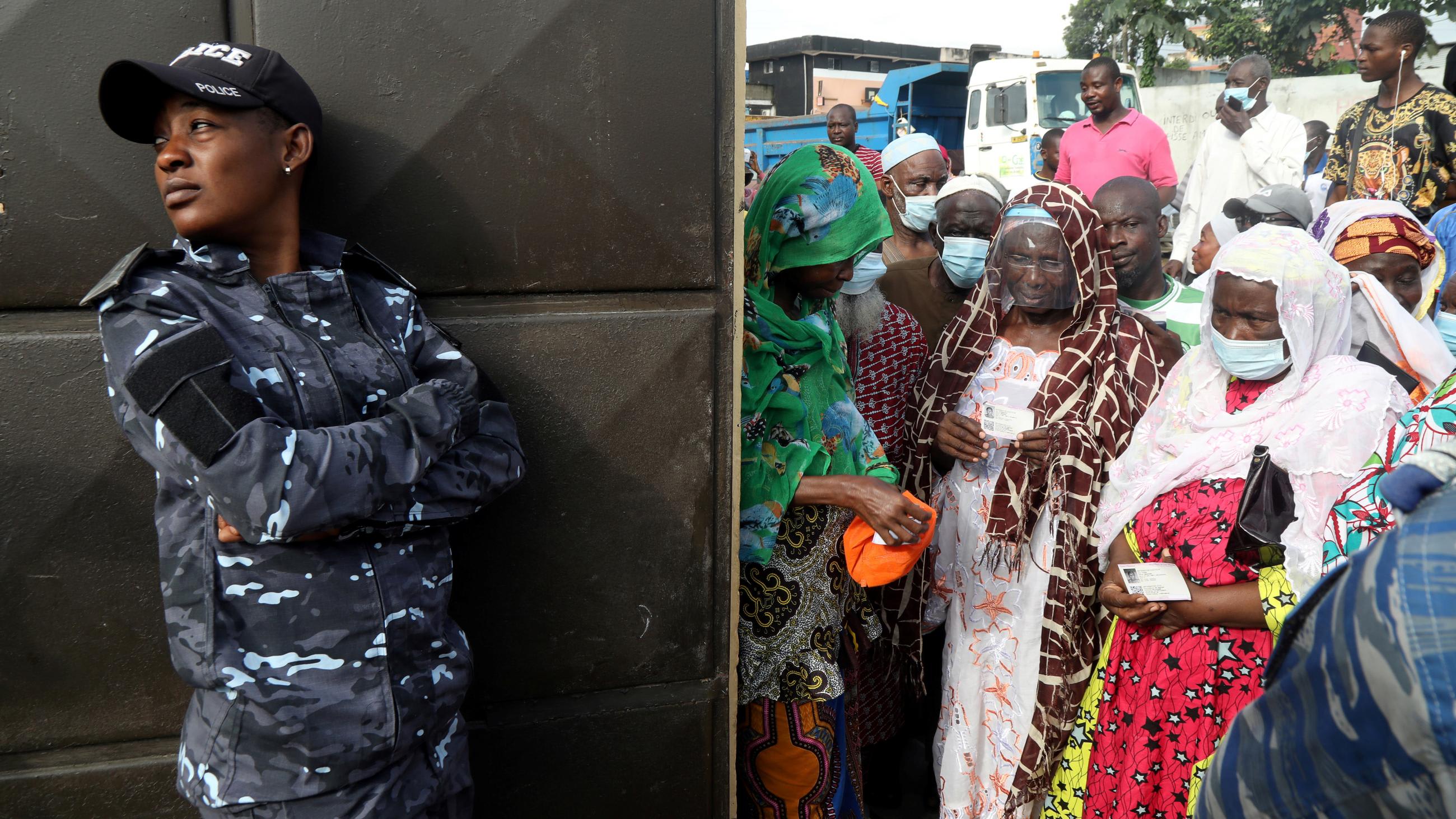
JAMAICA (4), Parliamentary, September 3
Jamaica implemented health security measures in four categories:
- PPE and other equipment: All voters and staff were required to wear masks. Polling facilities were required to provide single-use voting pencils and to take the temperature of all voters upon entry.
- Social distancing: All voters were required to maintain social distance.
- Special accommodations: Quarantined voters were permitted to vote during special hours prior to the election and with restrictions on transportation to and from polling places on election day. Infected voters were also permitted to vote during special hours on election day or prior to election day.
- Hygiene and sanitation: Jamaica deployed 7,400 sanitation officers to 2,200 polling stations to maintain regular sanitation and required continuous sanitization procedures. Voters were also required to sanitize their hands before entering the polling place.
Sources: Electoral Commission of Jamaica, BBC, Office of the Prime Minister
JORDAN (4), Legislative, November 10
Jordan implemented health security measures in four categories:
- PPE and other equipment: The country required all voters to wear masks. Each voter was a provided with a pen, and gloves were made available for those who wanted them.
- Social distancing: Jordan increased the total number of polling places and ballot-boxes in them to aid in social distancing.
- Special accommodations: The country offered specific voting hours for voters in quarantine and isolation and special voting locations to those in quarantine facilities. Priority voting was offered to pregnant women, the elderly, and people with disabilities.
- Hygiene and sanitation: Voters' fingers were sprayed with ink, rather than dipping their fingers into ink.
Note: Jordan also conducted mock elections prior to the real election to test safety measures.
Source: Independent Election Commission (1, 2, 3, 4)
KIRIBATI (1), General, April 14
Kiribati implemented health security measures in one category:
- Postponement: The country postponed its election originally scheduled for April 7. The new election took place on April 14.
KYRGYZSTAN (4), Parliamentary, October 4
Kyrgyzstan implemented health security measures in four categories:
- PPE and other equipment: Kyrgyzstan gave every voter a mask and gloves during polling. Poll workers, observers, and journalists were provided with protective suits. Polling stations were equipped with noncontact thermometers, and voters were required to have their temperature checked before voting. Bins were made available for disposing masks and gloves.
- Social distancing: Voters were required to maintain a distance of 1.5 to 2 meters from each other, even when queueing. The country installed information boards displaying the rules of social distancing throughout polling places. Polling places were organized in compliance with the social distancing rules, including the locations of ballot boxes, voting booths, and workplaces for poll workers. Voters were advised not to stay longer than fifteen minutes.
- Hygiene and sanitation: Kyrgyzstan required voters to maintain sanitary and hygienic standards. All polling places were to be equipped with disinfectants. Voters were to disinfect their hands before voting. All surfaces were to be disinfected at least twice per hour.
- Ventilation: The country called for local precincts to ventilate polling places.
Sources: Central Election Commission for Elections and Referenda, Reuters, TASS, Xinhua, IFES
LIBERIA (1), Senate, December 8
Liberia implemented health security measures in one category:
- Postponement: The country postponed its elections originally scheduled for November 13. Its elections are now scheduled to take place on December 8.
Source: IFES
LIECHTENSTEIN (2), Referendum, August 30
Liechtenstein implemented health security measures in two categories:
- Postponement: Liechtenstein postponed its referendum originally scheduled for June 7. The new referendum took place on August 30.
- Special accommodations: To facilitate voting, Liechtenstein allowed for universal mail-in ballots; however, this is a normal feature of Liechtenstein voting processes.
Sources: Embassy of Liechtenstein to the United States, Volksblatt, Vorarlberg
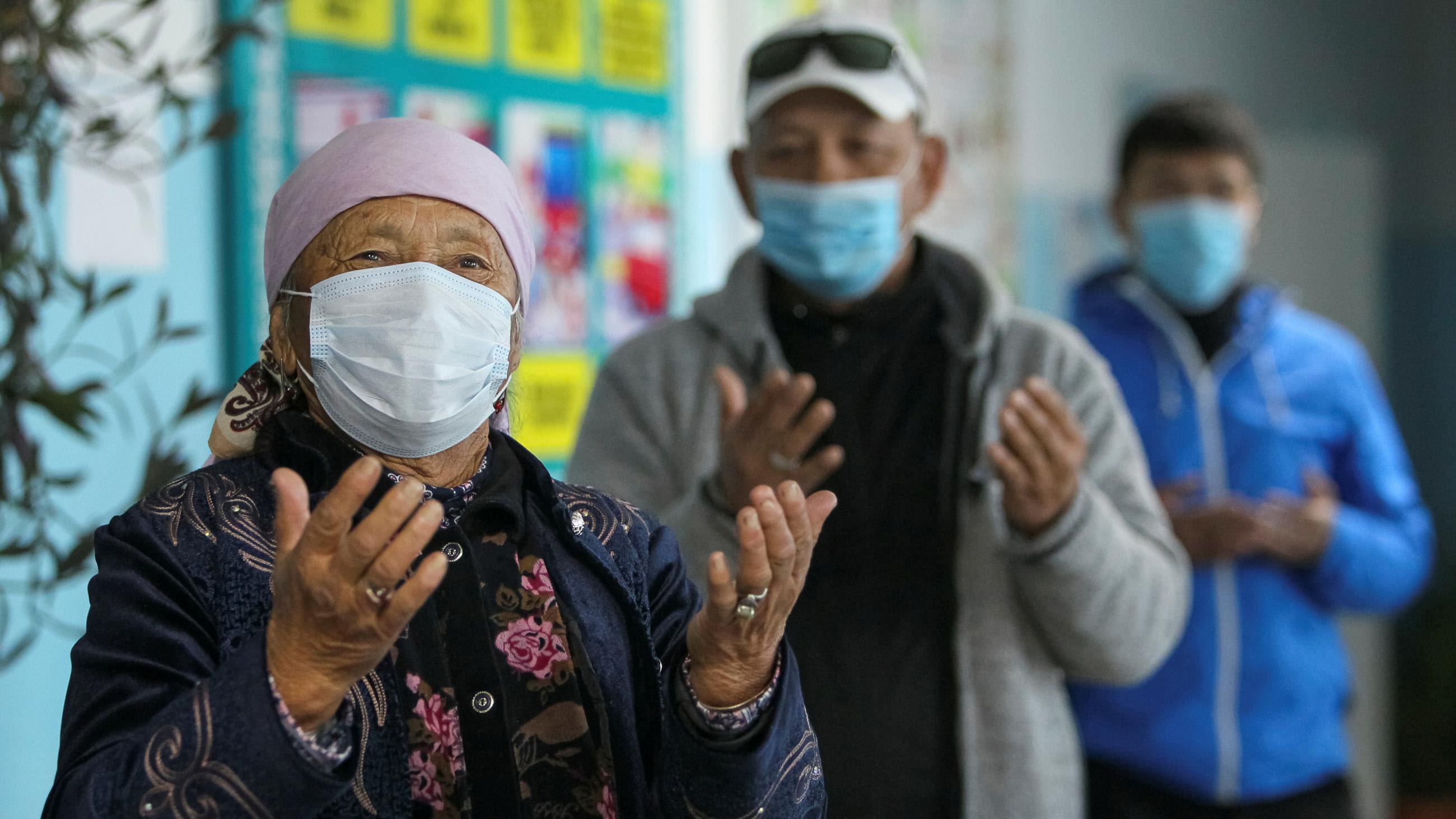
LITHUANIA (5), Parliamentary, October 11
Lithuania implemented health security measures in five categories:
- PPE and other equipment: The country required mask wearing inside the polling places. Voters were encouraged to bring their own pens.
- Social distancing: Lithuania required voters to maintain a distance of two meters. Polling places were required to regulate the flow of voters entering the premises, establish separate exits and entrances, space out tables, and, where possible, provide markings on the floor to guide the flow of traffic.
- Special accommodations: Lithuania permitted symptomatic voters to vote if they wore a FFP2 respirator without any valves. Polling places were encouraged to provide FFP2 respirators to voters with symptoms of acute respiratory infections. The country also allowed voters in isolation the right to vote at home.
- Hygiene and sanitation: Lithuania required polling places to provide hand sanitizer and place hygiene or disinfection devices at the entrance to polling places and at voting booths. Voters were required to disinfect their hands before entering the polling place, and poll workers were required to disinfect their hands after each voter. High-contact surfaces were disinfected at least every two hours, and polling places were disinfected at the end of each voting day. All voter identification documents were shown at a distance in order to avoid direct contact. Eating or drinking inside polling rooms was prohibited for poll workers.
- Ventilation: Lithuania recommended polling places ventilate the premises, preferably by opening windows for five minutes every hour—weather and building conditions permitting. Polling places were ventilated at the end of each voting day.
Sources: Central Electoral Commission (1, 2)
MALAWI (3), Presidential, June 23 and July 2
Malawi implemented health security measures in three categories:
- PPE and other equipment: The country recommended that voters use their own pens and pledged to provide masks, gloves, and water at all polling stations.
- Social distancing: Polling stations required voters to maintain social distancing and restricted gatherings of more than one hundred people.
- Hygiene and sanitation: Malawi pledged to provide hand sanitizer at all polling stations.
Sources: Election Commission, Quartz, Washington Post
MALI (2), Parliamentary, March 29 and April 19
Mali implemented health security measures in two categories:
- Social distancing: Voters were advised to respect social distancing.
- Hygiene and sanitation: Mali ordered hygiene kits for polling places; distribution for the first round of elections was reportedly inconsistent, but the second round saw improvements. Polling stations requested that voters wash their hands before entering polling stations.
Sources: Associated Press, Washington Post, DW
MOLDOVA (5), Presidential, November 1
Moldova implemented health security measures in five categories:
- PPE and other equipment: The country required poll workers to wear protective masks, gloves, and visors and to change their gloves and masks at least once every three hours. Voters were required to wear masks. Masks were available at polling places for those who needed them. All poll workers and voters had their temperature taken prior to entering the facility.
- Social distancing: Authorities limited the number of voters inside polling places at any given time to the number of available polling booths. Voters were required to maintain a distance of 1.5 meters from each other.
- Special accommodations: Voters with symptoms of COVID-19 were allowed to vote during specific hours, with polling places disinfected after those windows. Moldova also made mobile polling-boxes available to visit elderly, sick, isolating, and quarantining voters.
- Hygiene and sanitation: Moldova required the disinfection of polling places and their equipment at the start and end of the day. High-contact surfaces were disinfected at least once every three hours, and stamps used to mark that individuals had voted were disinfected at least once every half hour. All voter identification documents were shown at a distance in order to avoid direct contact.
- Ventilation: Moldova required frequent ventilation of the polling places and, where possible permanent ventilation.
Source: Central Election Commission
MONGOLIA (4), Parliamentary, June 24
Mongolia implemented health security measures in four categories:
- PPE and other equipment: Polling stations were required to take voters' temperatures before allowing them to enter. They also provided voters with gloves, which, in addition to masks, voters were required to wear while voting.
- Social distancing: Social distancing was enforced at polling stations.
- Hygiene and sanitation: Voters were required to sanitize their hands upon entering the voting facilities and again when identifying themselves via fingerprint check. Polling places were disinfected prior to voting day, and high-contact surfaces were disinfected every two hours and at least seven times on voting day.
- Ventilation: Polling places were ventilated regularly; poll staff were required to empty the voting rooms and open doors and windows every half hour for at least ten minutes.
Sources: Asia Foundation, Washington Post, General Election Committee
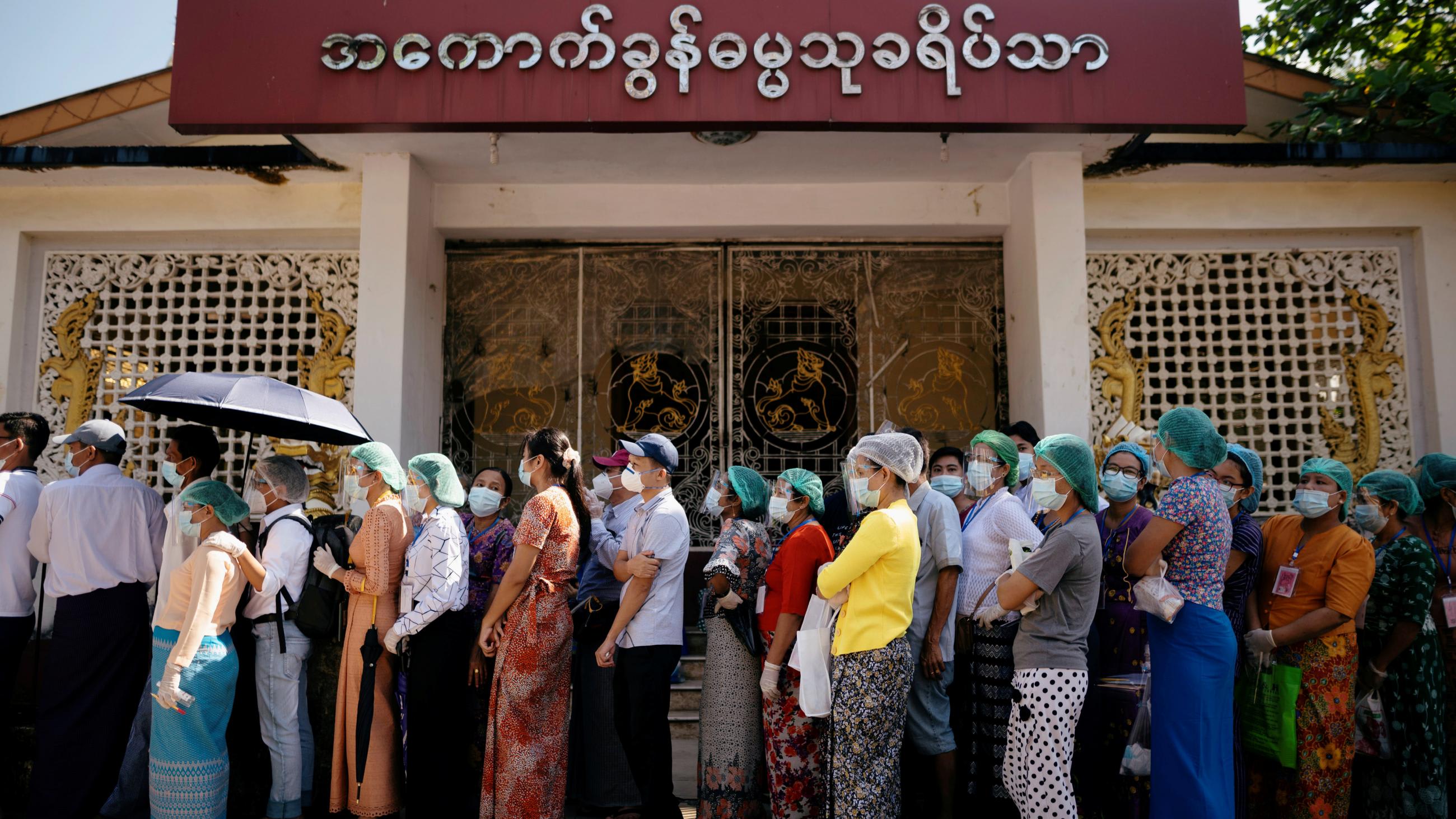
MONTENEGRO (5), Parliamentary, August 30
Montenegro implemented health security measures in five categories:
- PPE and other equipment: Polling stations required voters and staff to wear masks and gloves.
- Social distancing: Polling stations were required to enforce social distancing of at least two meters and to organize voting queues accordingly.
- Special accommodations: Montenegro provided special, epidemiological training to poll workers and permitted poll workers in full PPE to visit voters who were unable to vote in person. Hospitalized patients were allowed to vote by mail.
- Hygiene and sanitation: Polling stations required voters to disinfect their hands before entering the polling station and throughout the voting process. Montenegro recommended that polling stations place alcohol gels or hand sanitizers at their entrances and exits. Polling places were instructed to disinfect voting booths after use if the voter refused to disinfect their hands and to disinfect high-contact surfaces regularly.
- Ventilation: Montenegro recommended that polling places use spacious rooms with natural ventilation and that they keep doors and windows open as much as possible to ventilate continuously.
Sources: AA, State Electoral Board
MYANMAR (4), General, November 8
Myanmar implemented health security measures in four categories:
- PPE and other equipment: Myanmar required all voters to wear masks and provided masks to those who needed them. Polling places were required to take voters' temperatures at entrances. The country pledged to provide PPE to all poll workers.
- Social distancing: Voters were required to maintain social distancing of six feet, even while in line.
- Special accommodations: Early voting was offered to voters over the age of sixty. Special polling places were designated for quarantined voters.
- Hygiene and sanitation: The country required polling places to have hand sanitizer.
Sources: Union Election Commission (1, 2, 3), and Ministry of Health and Sports
NEW ZEALAND (5), Parliamentary, October 17
New Zealand implemented health security measures in five categories:
- PPE and other equipment: The country did not require voters to wear masks but had masks available at polling places for those who needed them. Voters were encouraged to bring their own pens.
- Social distancing: Authorities managed lines, allowing more room for physical distancing inside voting places. New Zealand increased the number and size of polling places to better allow for social distancing.
- Special accommodations: The country offered early voting beginning on October 3. Those who were unable to go to the polls in person could apply for postal voting or authorize someone to pick up and bring back their voting papers. Authorities also contacted all elder care facilities to arrange special voting services for residents. People in managed isolation or quarantine voted using a telephone dictation service.
- Hygiene and sanitation: Voters had to use hand sanitizer on the way in and out of voting places.
- Postponement: New Zealand postponed its elections, which were originally scheduled for September 19. Its vote took place on October 17.
Source: Electoral Commission (1, 2), New York Times
NIUE (0), General, May 30
Niue implemented no COVID-19 health security measures.
NORTH MACEDONIA (6), Parliamentary, July 15
North Macedonia implemented health security measures in six categories:
- PPE and other equipment: Polling stations provided voters with masks and gloves, and voters were required to wear a mask or scarf before entry. Poll workers were required to wear a mask and gloves.
- Social distancing: North Macedonia required social distancing of 1.5 to 2 meters for voters and 1 to 1.5 meters for poll workers. Polling places limited the number of voters at a time to the number of voting booths inside. The country recommended that polling places utilize social distancing markers and separate flows of people into, out of, and within polling places where possible.
- Special accommodations: Voters who were either quarantined or in isolation due to COVID-19 were allowed to vote two days before the election. Sick and weak voters were allowed to vote one day before the election.
- Hygiene and sanitation: North Macedonia required thorough, mechanical cleaning and disinfection of polling places and restrooms prior to the election day. It provided disinfection equipment, including paper hand wipes, soap, and alcohol-based disinfectants, for each polling place. Polling stations were required to frequently clean restrooms, and voters were instructed disinfect their hands when entering and exiting the polling place. Voters were also required to present identifying documents at a distance.
- Ventilation: Officials recommended that windows at polling places be left open during voting or opened every hour for ventilation purposes.
- Postponement: North Macedonia postponed its elections originally scheduled for April 12. The new elections took place on July 15.
Source: State Election Commission
PALAU (0), Presidential, September 22 and November 3
Palau implemented no health security measures against COVID-19.
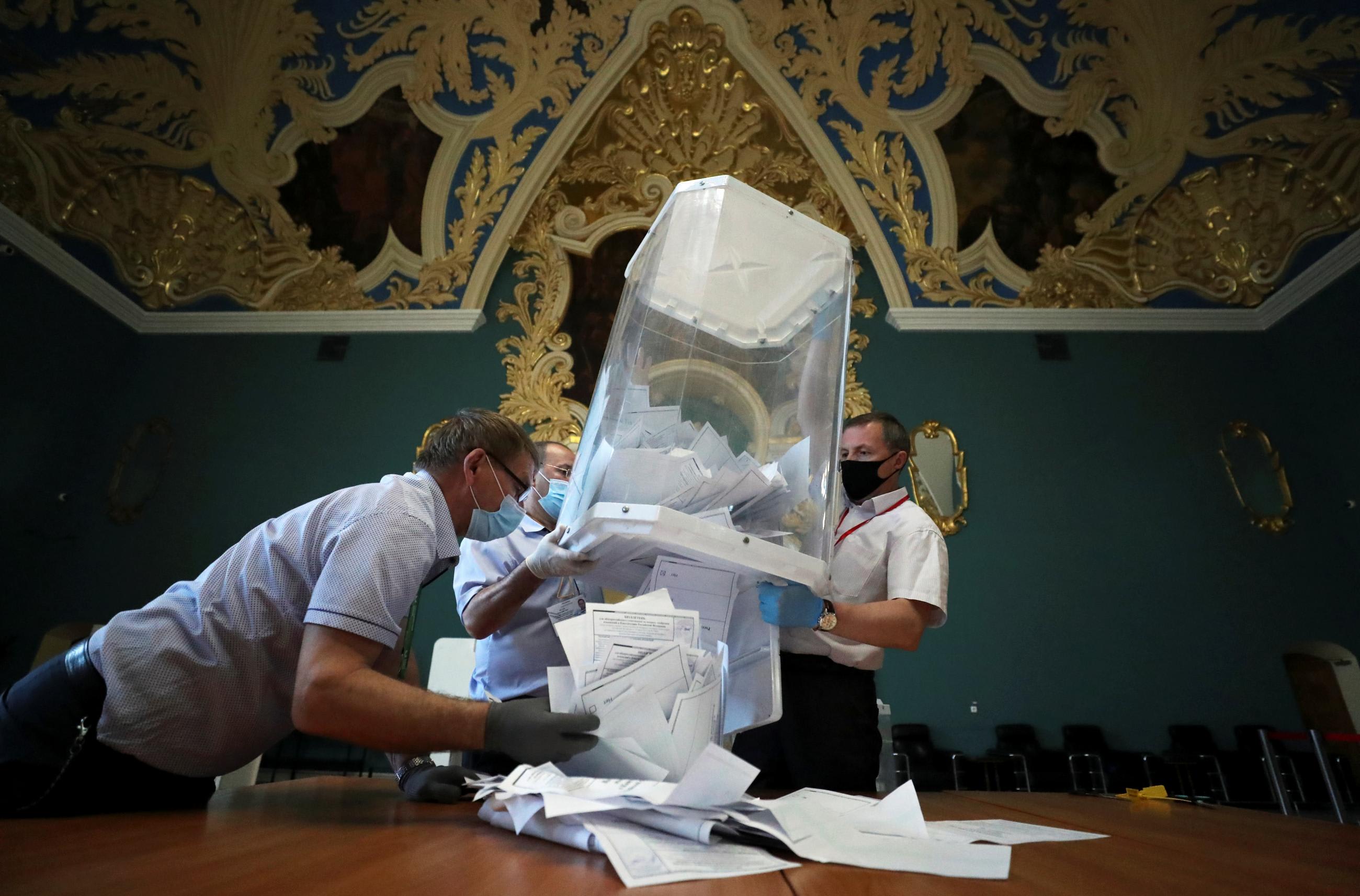
POLAND (6), Presidential, June 28 and July 12
Poland implemented health security measures in six categories:
- PPE and other equipment: The country provided masks, visors, and gloves for all poll workers and required all voters and polling staff to wear masks.
- Social distancing: Social distancing of at least 1.5 meters was required for all voters and poll workers, and polling places set up voting stations with barriers.
- Special accommodations: Poland allowed all voters to vote by mail, including from abroad. The country recommended priority and early voting for vulnerable groups, including older voters and pregnant women.
- Hygiene and sanitation: Polling places installed hand sanitizers at their entrances, and voters were required to disinfect their hands when entering and exiting the premises. Polling stations were encouraged to disinfect high-contact surfaces at least every hour and to avoid covering tables with cloth or other absorbent material. Voters were required to present identifying documents at a distance unless otherwise specified in specific circumstances.
- Ventilation: Poll workers were encouraged to air out the polling place regularly, preferably for ten minutes every hour.
- Postponement: Poland postponed its elections originally scheduled for May 10. The first round of the new elections took place on June 28 and the second round on July 12.
Sources: National Election Office (1, 2, 3), IDEA, IFES
RUSSIA (6), Referendum, July 1
Russia implemented health security measures in six categories:
- PPE and other equipment: The country required polling stations to take the temperature of all voters via noncontact thermometers. It also provided poll workers with masks, gloves, personal protective screens, disinfectant material, and, if necessary, additional PPE such as gowns. Voters were given sanitary kits, which included a mask, gloves, and an individual pen for voting. All voters were required to wear masks and gloves.
- Social distancing: To facilitate social distancing, Russia held early voting from June 25 to June 30. If traditional facilities were inadequate to maintain social distancing or separate exits and entrances, polling places were advised to move voting outdoors. Polling places were also required to enforce social distancing of 1.5 to 2 meters and to establish separate entrance and exit lines and doors to ease the movement of people.
- Special accommodations: Polling places were required to have portable voting boxes in case a voter could not vote inside the polling place and an additional room to place people who arrived at the polling station with an elevated temperature. People were allowed to vote from their homes if necessary.
- Hygiene and sanitation: Polling places were required to keep restrooms open, stocked with soap, and supplied with materials to dry hands. If possible, polling places were to provide an antiseptic device at all entrances and exits to disinfect the footwear of all persons entering the polling place. All voters were required to disinfect their hands when entering and exiting the polling place as well. Poll staff were required to sanitize the polling station at the end of each day and to disinfect high-contact surfaces periodically. Shaking hands, eating, and drinking inside the polling places were prohibited, and voters were required to present identifying documents at a distance to minimize contact.
- Ventilation: All polling places were required to have proper ventilation. If traditional polling places lacked windows, Russia recommended that polling stations be relocated outdoors.
- Postponement: Russia postponed its elections originally scheduled for April 22. The new elections took place on July 1.
Sources: Central Election Commission (1, 2), CNN
SERBIA (4), Parliamentary, June 21
Serbia implemented health security measures in four categories:
- PPE and other equipment: Polling places provided voters with masks, but mask wearing was not mandatory for voters. All poll workers were encouraged to wear masks and gloves.
- Social distancing: Poll workers were requested to maintain one meter of distance from other poll workers.
- Hygiene and sanitation: Poll workers were asked to disinfect their hands often.
- Ventilation: Serbia encouraged polling places to ventilate their rooms regularly.
Sources: Ministry of Health, Reuters, IFES, RTS
SEYCHELLES (4), General, October 22–24
Seychelles implemented health security measures in four categories:
- PPE and other equipment: The country ensured that all staff working at special voting stations were tested for COVID-19 and were equipped with protective gear. Seychelles required all individuals to wear masks, per a national mask mandate.
- Social distancing: Seychelles prohibited gatherings at polling places and requested voters to maintain social distancing of at least one meter.
- Special accommodations: The country offered special voting stations for those in quarantine facilities, the elderly, essential workers, and those not at their normal place of residence.
- Hygiene and sanitation: Voters had to use hand sanitizer on the way in and out of voting places. Seychelles required that polling places were regularly sanitized.
Sources: Seychelles Nation (1, 2, 3. 4, 5), Ministry of Foreign Affairs
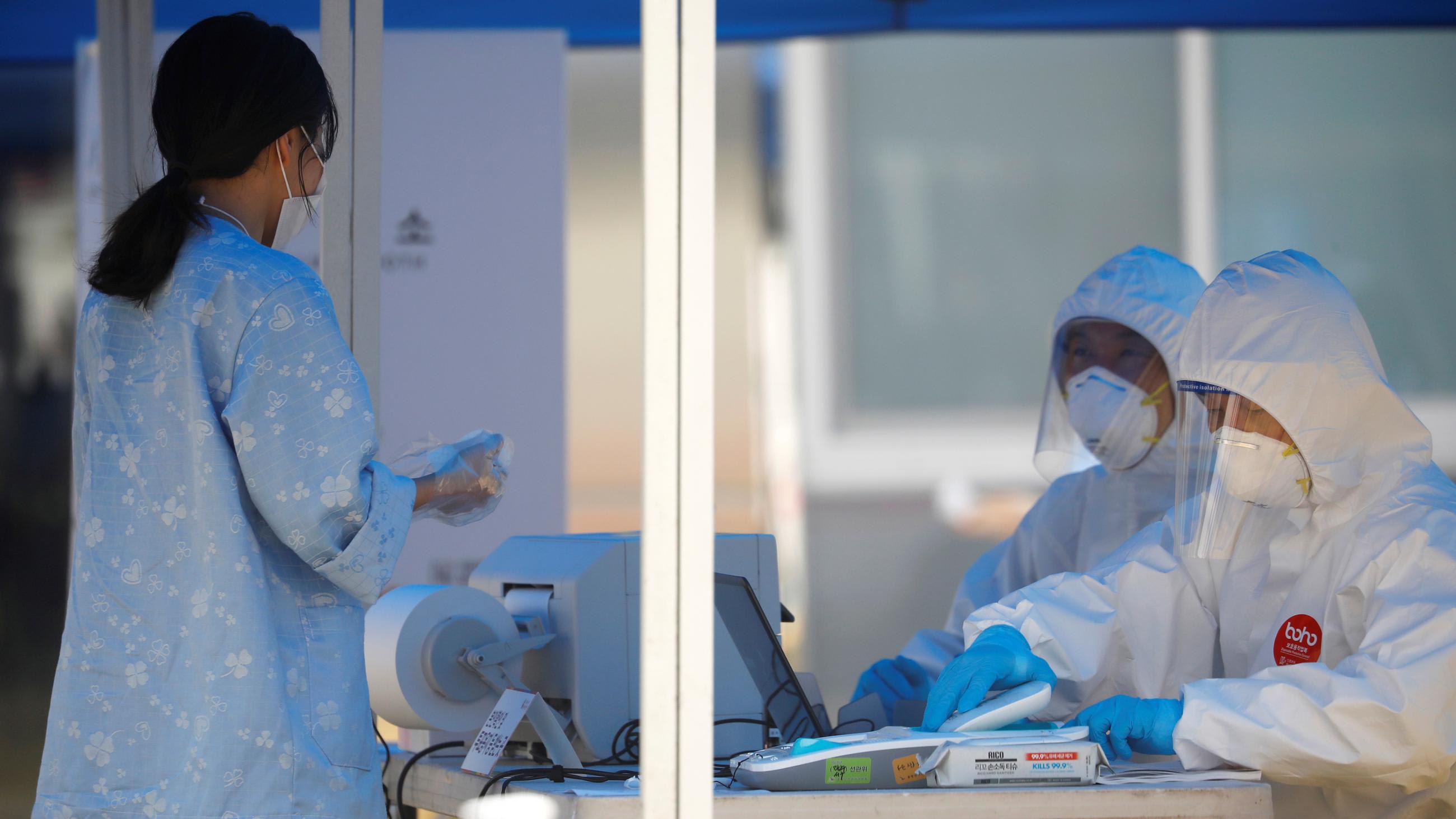
SINGAPORE (4), Parliamentary, July 10
Singapore implemented health security measures in four categories:
- PPE and other equipment: The country required voters and staff to wear masks in domestic and overseas polling stations. Voters were required to wear gloves, which the polling station provided. Singapore provided poll workers with masks, gloves, and face shields. All voters were required to have their temperature taken before voting, and they were allowed to bring their own pens.
- Social distancing: Singapore assigned all voters a recommended two-hour voting window to avoid overcrowding and established 220 additional polling stations. All voters and poll workers were required to maintain social distancing of at least one meter within polling places. Voters were prohibited from remaining in the polling place for more than five minutes.
- Special accommodations: Mobile polling was provided to individuals required to stay home because of quarantine or isolation. Singapore offered special voting hours to those with fevers and assigned special two-hour voting windows in the morning to voters aged sixty-five and older.
- Hygiene and sanitation: All voters were required to disinfect their hands prior to voting. Poll workers were given personal hand sanitizers and were required to disinfect high-contact surfaces at least once every half hour.
Sources: Prime Minister's Office, Government of Singapore
SLOVAKIA (0), General, February 29
Slovakia implemented no COVID-19 health security measures.
SOMALIA (1), Parliamentary, December 1–27
Somalia implemented health security measures in one category:
- Postponement: The country postponed its elections originally scheduled for November 27. Its parliamentary elections are now scheduled to take place between December 1 and December 27.
SOUTH KOREA (4), Parliamentary, April 15
South Korea implemented health security measures in four categories:
- PPE and other equipment: The country required all voters to wear masks and gloves. Polling stations provided voters with gloves and were required to take the temperature of all voters.
- Social distancing: South Korea installed an increased number of polling places to facilitate social distancing. Polling places were mostly installed on the ground floor to avoid elevator use, and voters were encouraged to maintain a distance of at least one meter between one another.
- Special accommodations: Confirmed and suspected COVID-19 patients were permitted to vote from home, at hospitals, or by mail-in or absentee ballots. South Korea established special early polling places for persons with confirmed COVID-19 cases that were diagnosed after the deadline to register to vote from home. Special polling places for voters with temperatures or other COVID-19 symptoms were also established, and quarantined voters were escorted to the polling places at the end of election day, where they voted during designated hours.
- Hygiene and sanitation: Polling places provided hand sanitizer and disinfected high-contact surfaces regularly. Voters were required to disinfect their hands upon entering the polling place.
Sources: National Election Commission (1, 2), Reuters
SRI LANKA (4), Parliamentary, August 5
Sri Lanka implemented health security measures in four categories:
- PPE and other equipment: Poll workers and officials were required to remain behind plastic screens or wear face masks. Voters were required to wear face masks and bring their own pens.
- Social distancing: Sri Lanka required voters to maintain a distance of at least one meter and extended voting hours to avoid overcrowding.
- Hygiene and sanitation: Polling places provided water taps or hand sanitizer. Voters were required to wash hands before taking ballots.
- Postponement: The country postponed its elections originally scheduled for April 25. Its elections took place on August 5.
Note: Sri Lanka also conducted mock elections prior to the real election to test safety measures.
Sources: DW, New York Times, Nikkei
ST. KITTS AND NEVIS (3), General, June 5
St. Kitts and Nevis implemented health security measures in three categories:
- PPE and other equipment: The country required polling stations to provide masks to voters. All poll workers and voters were required to wear masks.
- Social distancing: Polling stations were required to enforce social distancing between voters.
- Hygiene and sanitation: Voters were required to sanitize their hands before placing their fingers in ink to cast their ballots. Poll workers sanitized desktops and other public areas in polling places regularly throughout the day.
Sources: Ministry of Health, St. Kitts and Nevis Observer
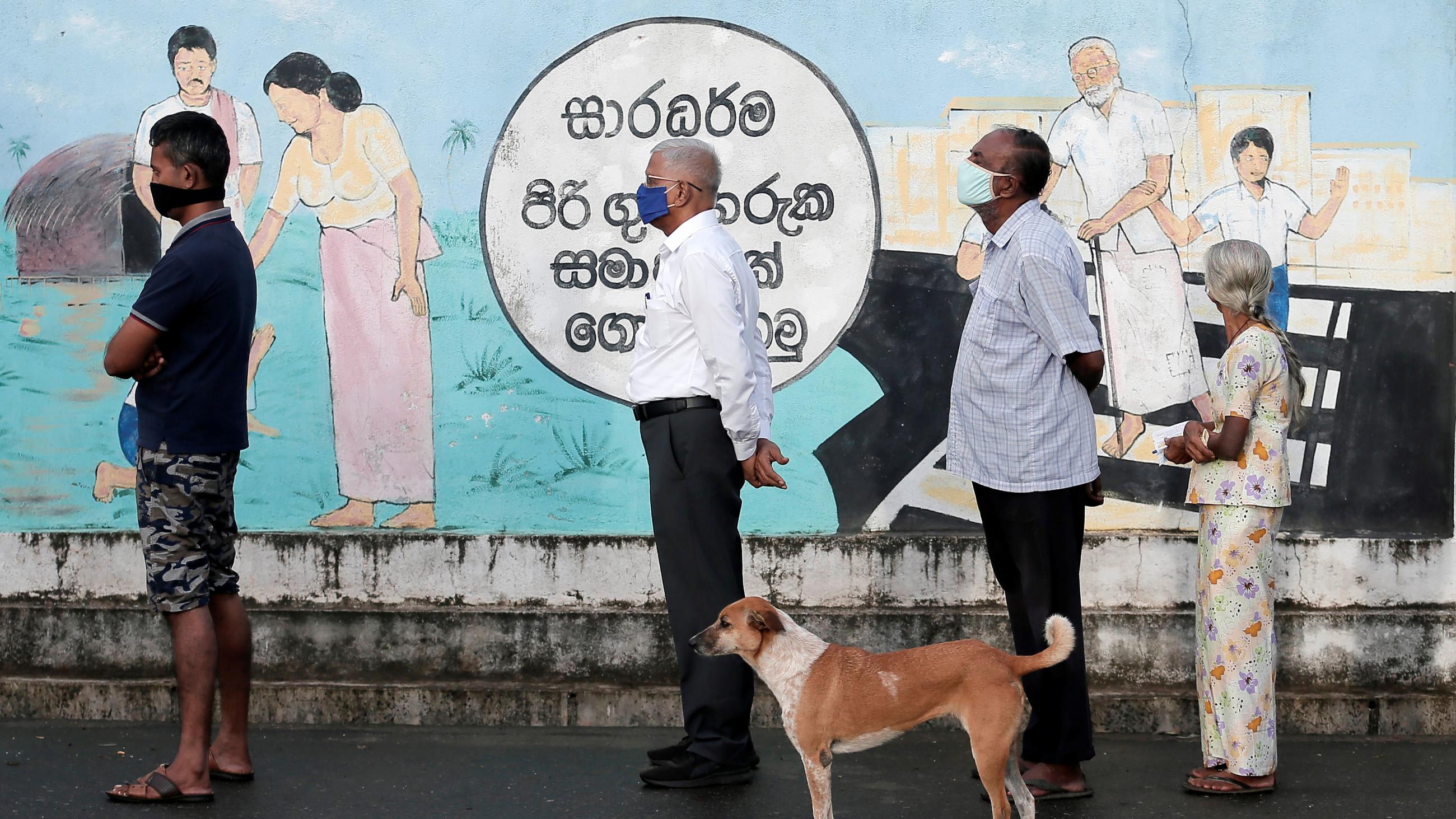
ST. VINCENT AND THE GRENADINES (3), Parliament, November 5
St. Vincent and the Grenadines implemented health security measures in three categories:
- PPE and other equipment: The country required all poll workers to wear face coverings, gloves, and masks and encouraged workers to regularly change their gloves. General voters were encouraged to wear masks. Voters in quarantine were required to wear a face mask.
- Special accommodations: St. Vincent offered early voting to frontline workers and a specific voting window on election day to voters who were at least six days into a quarantine period.
- Hygiene and sanitation: The country required voters to sanitize their hands before and after removing their mask for identification purposes, before dipping their fingers in ink, and after voting. St. Vincent recommended that all poll workers regularly sanitize their hands.
Sources: Electoral Office (1, 2, 3)
SURINAME (3), General, May 25
Suriname implemented health security measures in three categories:
- Social distancing: Officials encouraged voters to maintain a distance of five feet.
- Special accommodations: Suriname established special mobile polling places for people in quarantine.
- Hygiene and sanitation: Voters were prohibited from dipping their fingers in an ink pot; instead, officials dabbed ink on voters' fingers.
Sources: Ministry of Health, France24
SWITZERLAND (0), Referendum, February 9
Switzerland implemented health security measures in one category:
- Special accommodations: The country allowed for universal mail-in ballots; however, this is a normal feature of Switzerland's voting processes.
Source: Swiss Confederation
SWITZERLAND (4), Referendum, September 27
Switzerland implemented health security measures in four categories:
- Social distancing: Switzerland required social distancing rules to be followed at polling places.
- Special accommodations: The country allowed for universal mail-in ballots; however, this is a normal feature of Switzerland's voting processes.
- Hygiene and sanitation: Switzerland required proper hygiene rules be followed at polling places.
- Postponement: The country postponed its referendum originally scheduled for May 17. Its referendum took place on September 27.
Sources: SwissInfo, Swiss Confederation
SYRIA (5), Parliamentary, July 19
Syria implemented health security measures in five categories:
- PPE and other equipment: The country required poll workers to wear masks and gloves and voters to wear face masks and bring their own pens.
- Social distancing: Polling stations were required to ensure that voters maintain social distancing. Voters were asked to leave the polling station immediately after voting to avoid crowding.
- Hygiene and sanitation: Poll workers sanitized voting booths and high-contact surfaces after voting.
- Ventilation: Syria prevented smoking at polling places and encouraged enhanced ventilation at polling places.
- Postponement: The country postponed its elections twice, originally scheduled for April 13 and then May 20. Its new elections took place on July 19.
Sources: Associated Press (1, 2)
TAJIKISTAN (0), Parliamentary, March 1
Tajikistan implemented no COVID-19 health security measures.
TAJIKISTAN (4), Presidential, October 11
Tajikistan implemented health security measures in four categories:
- PPE and other equipment: The country required that masks be worn in polling stations. Tajikistan provided polling places with necessary stocks of PPE. Poll workers checked voters' temperature upon their entry into the polling place and were required to wear both face masks and shields.
- Social distancing: Polling places spaced out check-in tables. Voters and observers were required to maintain strict social distancing at polling places.
- Hygiene and sanitation: Tajikistan provided hand sanitizer or spray and antiseptics to all polling stations. Polling places were decontaminated every two to three hours.
- Ventilation: Polling places were regularly ventilated every two to three hours.
Sources: Central Election Commission for Elections and Referenda, Reuters, TASS, Xinhua, IFES
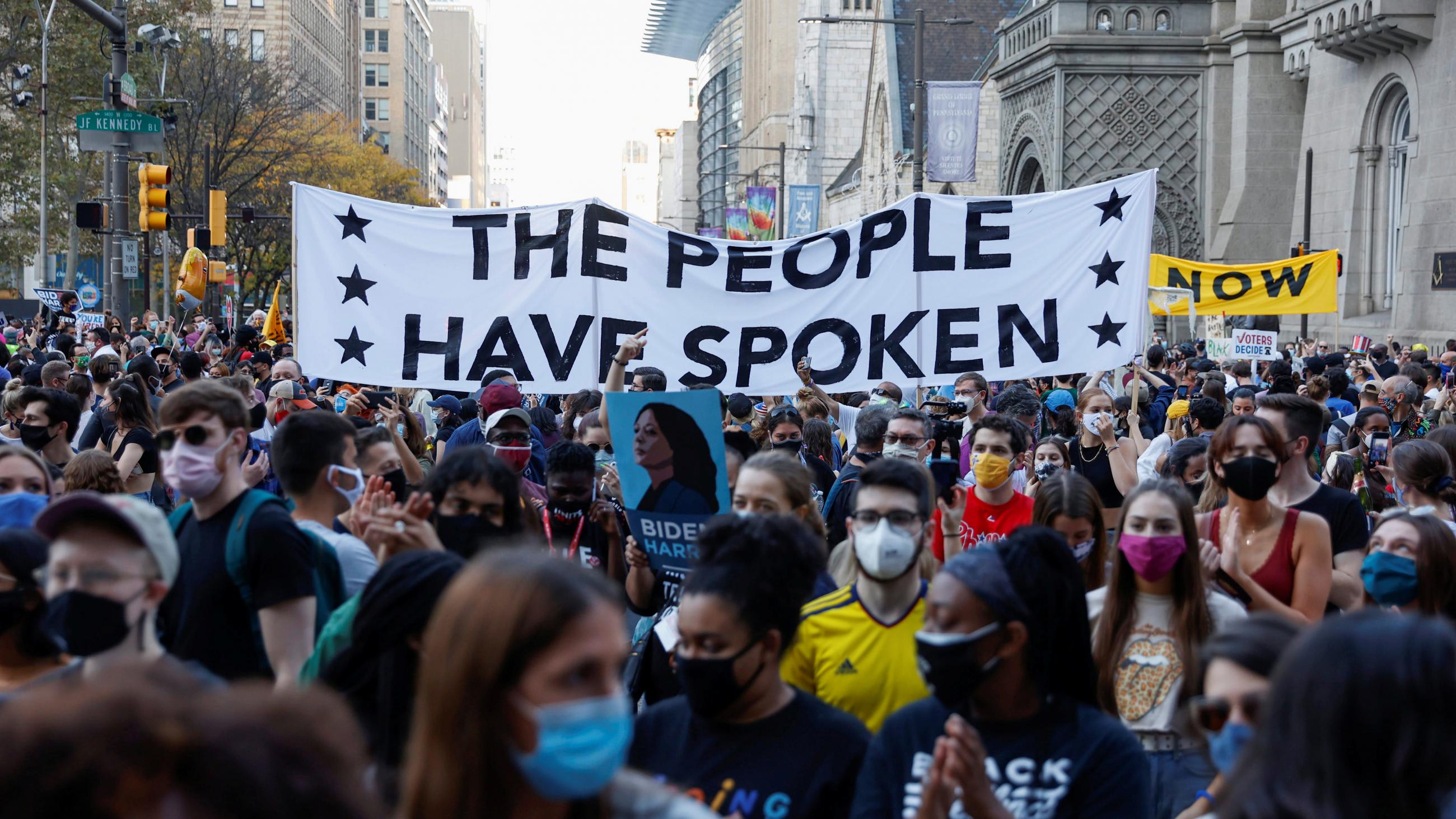
TANZANIA (0), General, October 28
Tanzania implemented no COVID-19 health security measures.
TOGO (0), Presidential, February 22
Togo implemented no COVID-19 health security measures.
TRINIDAD AND TOBAGO (4), General, August 10
Trinidad and Tobago implemented health security measures in four categories:
- PPE and other equipment: Polling places provided voters with masks. Although not required, it was recommended that voters wear masks.
- Social distancing: Polling places were instructed to limit the amount of people inside and to ensure that voters maintained a distance of at least six feet.
- Special accommodations: Trinidad and Tobago established special polling places to hold early elections. It also allowed voters in quarantine to vote as special electors.
- Hygiene and sanitation: Voters were required to disinfect their hands when entering a polling place and when entering a voting booth. Poll workers were required to disinfect voting stamps between every voter.
Note: Trinidad and Tobago also conducted mock elections prior to the real election to test safety measures.
Sources: Elections and Boundaries Commission (1, 2), Office of the Prime Minister, Ministry of Communications, Loop Trinidad and Tobago
UNITED STATES (5), General, November 3
The United States implemented health security measures in five categories:
- PPE and other equipment: The country recommended the use of masks among all poll workers and encouraged voters to also wear masks. Polling places were asked to replace shared objects, such as pens, with single-use objects where possible.
- Social distancing: The United States recommended individuals maintain social distancing of at least six feet. Voting booths were placed six feet apart. The country encouraged states to increase the number of polling places available for early voting and extend hours of operation. Lines were moved outdoors when weather permitted. The United States encouraged polling places to direct flows of incoming and outgoing people if possible. States were encouraged to offer scheduled voting time slots or staggered entry into polling places.
- Special accommodations: States were encouraged to offer alternative voting methods, such as early in-person voting, extended hours, drive-up voting, and mail-in ballots. Jurisdictions were asked to offer alternative voting options for sick voters, such as curbside voting or designated polling places.
- Hygiene and sanitation: The United States recommended polling places provide hand sanitizer at each step in the voting process. Voters were asked to wash their hands before entering and after leaving the polling place and to sanitize their hands throughout the voting process. Polling places were asked to provide sufficient access to sinks, soap, hand dryers, and hand sanitizers. Poll workers were encouraged to wash their hands frequently. The country required polling places to frequently disinfect high-contact surfaces and restrooms. Polling places were disinfected after closing. If polling places did not provide single-use pens, they were asked to disinfect pens between each use.
- Ventilation: The United States asked polling places to ensure that ventilation systems operated properly and to increase circulation of outdoor air as much as possible, including by opening doors and windows.
Note: These recommendations were national guidelines. Some states, counties, or cities, implemented stricter measures, such as requiring mask wearing.
Source: Centers for Disease Control and Prevention
VANUATU (2), General, March 19
Vanuatu implemented health security measures in two categories:
- Social distancing: The country encouraged voters to maintain social distancing at polling places.
- Hygiene and sanitation: Polling places provided hand sanitizer and encouraged voters to disinfect their hands prior to voting.
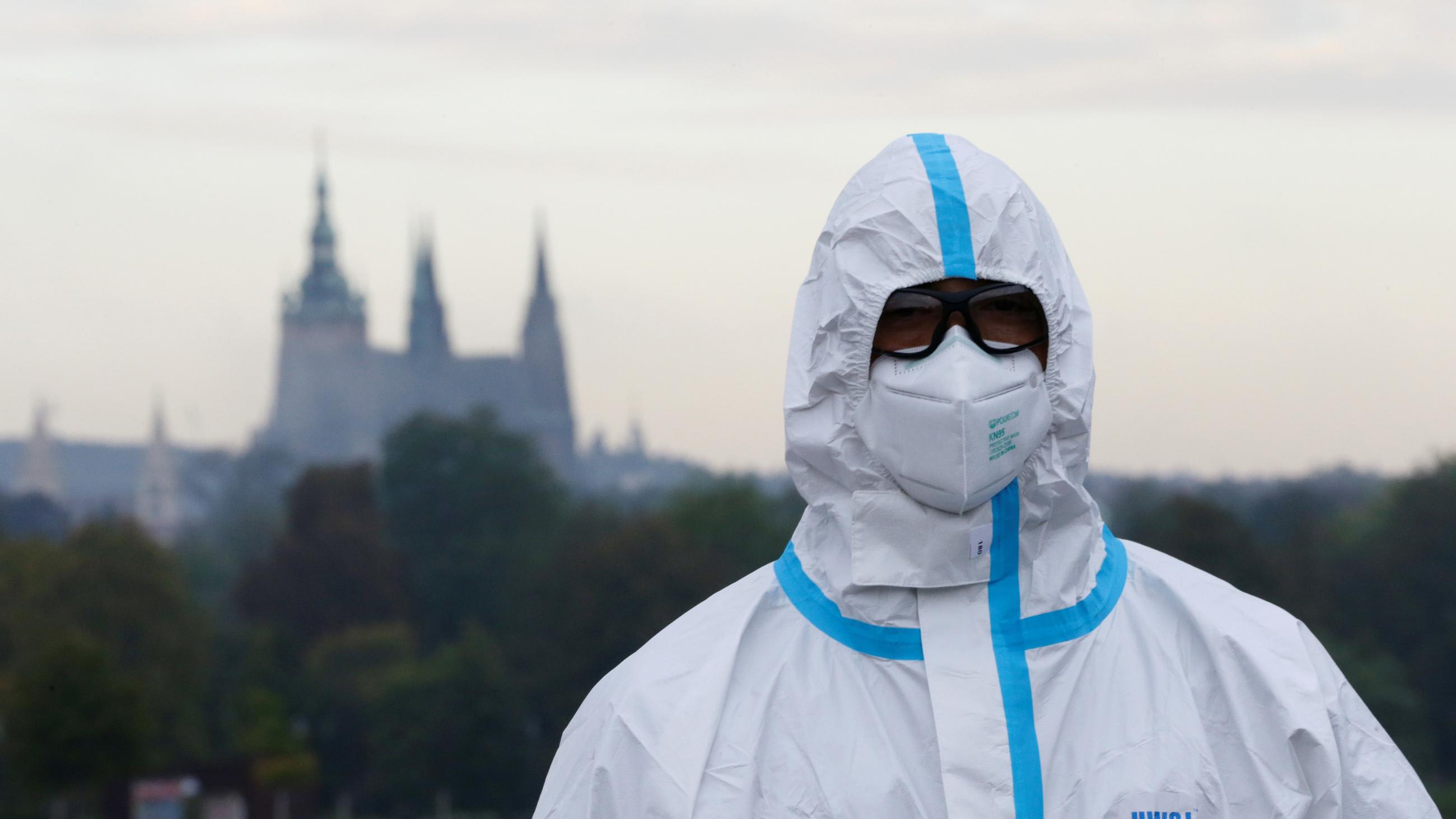
EDITOR'S NOTE: Jason Socrates Bardi, former deputy managing editor of Think Global Health, contributed to the development of this tracker. This tracker was originally posted on October 2, 2020, and is updated regularly.
